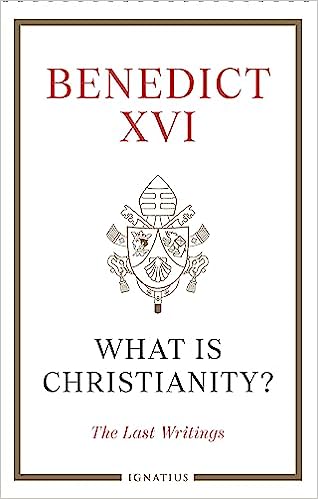 |
What Is Christianity?: The Last Writings Ignatius Press (August 1, 2023). 239 pages.
After Pope Emeritus Benedict XVI resigned from the papacy in 2013, he never stopped thinking or writing. Near the end of his life, he and editor Elio Guerriero gathered together a whole volume of new material, dealing with the themes closest to his heart. The pope asked that it be published upon his death.
This final work is What Is Christianity? It takes up a kaleidoscopic array of themes: the Christian faith's relationship with other religions, especially Judaism and Islam; the theology and reform of the liturgy; the priesthood; the saints; the Eucharist; the tragedy of abuse; the beauty of nature; Italian and German culture; and much more. With prophetic insight into our times, Benedict warns of a "radical manipulation of man" in the name of tolerance, insisting that the only "authentic counterweight to every form of intolerance" is Christ himself—and Christ crucified. A lifelong Catholic, the late pope pays tribute to some of the giant figures of Christianity who have served him through the years as guiding stars: his predecessor Pope John Paul II, the twentieth-century German Jesuit martyr Alfred Delp, and the silent carpenter Joseph, his patron saint. What Is Christianity? is a frank spiritual testament from a theological master, a churchman who loved the faith of simple Christians but who always stood ready, even in his last days, to dialogue about every aspect of human life—in love and in truth. |
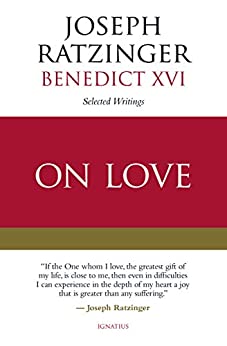 | On Love: Selected Writings Ignatius Press (January 21, 2021). 149 pages. In these homilies, most of which are previously unpublished, Joseph Ratzinger, now Pope Emeritus Benedict XVI, adimdresses the theme he has celebrated, pondered, and witnessed by his life more than any other: love. For him, love is the vital nucleus of the Church and to serve Christ is above all a question of love: "Peter, do you love me? Feed my sheep" (Jn 21:15–17).
Love is also the quest of every human being on the journey toward eternity. He beautifully states, "Christianity is a movement, a journey; it is not a theory, a sum total of doctrine; Christianity is life, it is a vital impetus that carries us toward true life. . . . Someone who has found love can say: I have found life." Arranged by the liturgical seasons of the Church year, the homilies predate the author's pontificate. The earliest dates from 1970 while he was still a professor of theology. Thus, this collection traces the way Joseph Ratzinger has been enamored of the love of God throughout his years of serving the Church. |
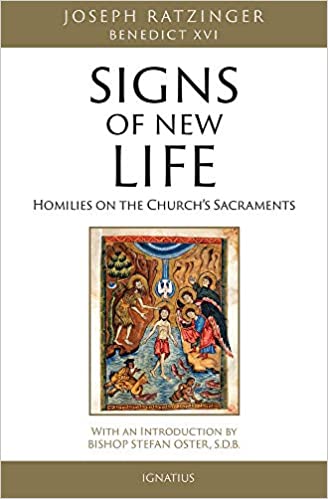 | Signs of New Life: Homilies on the Church's Sacraments by Joseph Ratzinger. Ignatius Press; None edition (March 15, 2020). 125 pages. At life's many crossroads, the Sacraments of the Church continually bring people into contact with the saving work of God: Baptism, Confirmation, Confession, Holy Eucharist, Matrimony Holy Orders, Anointing of the Sick. The celebrations of the Church always offer an opportunity to announce the faith and deepen our understanding of it. Signs of New Life gathers a selection of fourteen homilies by Joseph Ratzinger (Pope Benedict XVI) on each of the Seven Sacraments, as well as an additional two texts on the theme of the Church more broadly. Ratzinger endeavored as a theologian to develop an understanding of the Sacraments in new ways and to make fruitful the participation of others in the celebration of them. Many of his homilies refer to individual Sacraments and connect them with a profound interpretation of Scripture and of the Christ event. The Scriptural passages interpreted in each homily are listed at the start, so that this volume can also be used for Scriptural meditation and spiritual reading. This book is intended to help us grasp more profoundly the essence of the Church and to aid us in celebrating and proclaiming the Sacraments as that which they truly are: signs of the new life in Christ. |
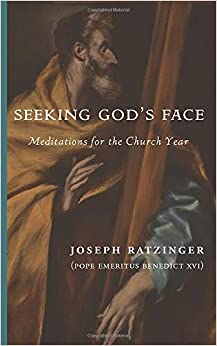 | Seeking God's Face: Meditations for the Church Year By Joseph Ratzinger Cluny Media (February 18, 2020). 154 pages. "Seek out the Lord and his might; constantly seek his face.” This concise admonition from the Book of Psalms captures the impetus of Seeking God’s Face. In these meditations, Joseph Ratzinger reflects upon the major feasts and the Sundays of the year, inspired by Scripture, the Church Fathers, and the lives of the saints. The seasons of Advent and Christmas receive particular attention, with an address on the mystery of suffering, a sermon on the “Word Made Flesh,” and a consideration of the contribution of St. Francis of Assisi to Christmas celebrations, which join “The Lesson of the Christmas Donkey” by Pope John Paul I in honoring the birth of Jesus Christ, in whom we encounter the very face of God. Originally published in English in 1982, Seeking God’s Face shines with a spirit of joyful wisdom and serves as a source for much fruitful meditation on the central mysteries of the Catholic faith as they are celebrated over the course of the Church calendar. |
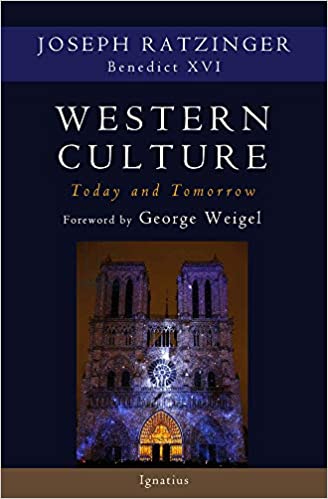 | Western Culture Today and Tomorrow: Addressing the Fundamental Issuesbr>By Joseph Ratzinger< Ignatius Press (October 15, 2019). 170 pages. Well known for his important scholarly contributions to dogmatic theology and biblical commentary, Joseph Ratzinger has also been an insightful, shrewd analyst of political modernity and its discontents. This work reveals Ratzinger's keen insight into the fundamental challenges confronting the twenty-first-century West. |
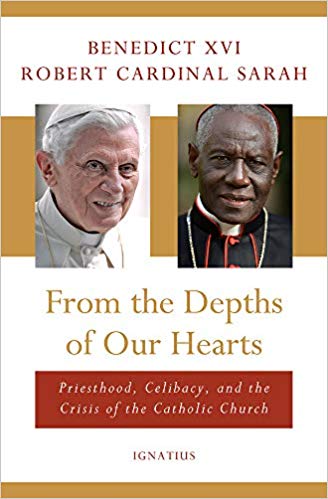 | From the Depths of Our Hearts: Priesthood, Celibacy and the Crisis of the Catholic Church by Benedict XVI (Author), Robert Cardinal Sarah (Author) Ignatius Press (March 12, 2020). 152 pages. The Catholic Church faces a major crisis and the turmoil in priestly ministry is at the heart of it. "The priesthood is going through a dark time," write Pope Emeritus Benedict and Cardinal Robert Sarah. “Wounded by the revelation of so many scandals, disconcerted by the constant questioning of their consecrated celibacy, many priests are tempted by the thought of giving up and abandoning everything." In this book, Pope Emeritus Benedict and Cardinal Robert Sarah give their brother priests and the whole Church a message of hope. They honestly address the spiritual challenges faced by priests today, including struggles of celibacy. They point to deeper conversion to Jesus Christ as the key to faithful and fruitful priestly ministry and church reform. From the Depths of Our Hearts is an unprecedented work by the Pope Emeritus and a Cardinal serving in the Vatican. As bishops, they write “in a spirit of filial obedience” to Pope Francis, who has said, "I think that celibacy is a gift for the Church... I don’t agree with allowing optional celibacy, no." Responding to calls for refashioning the priesthood, including proposals from the Amazonian Synod, two wise, spiritually astute pastors explain the biblical and spiritual role of the priesthood, celibacy, and genuine priestly ministry. Drawing on Vatican II, they present priestly celibacy as more than “a mere precept of ecclesiastical law”. They insist that renewal of the Church is bound to a renewed understanding of priestly vocation as sharing in Jesus’ priestly identity as Bridegroom of the Church. This is a book whose crucial message is for clergy and laity alike. |
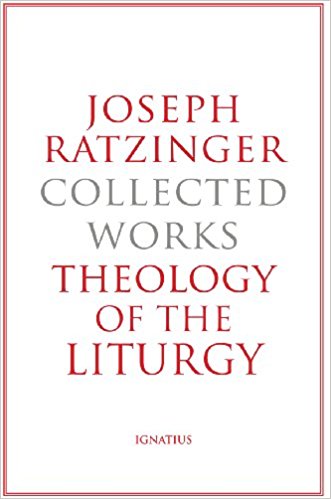 | Joseph Ratzinger - Collected Works: Theology of the Liturgy, by Joseph Ratzinger. Ignatius Press (May 5, 2014) 660 pgs. This major volume is a collection of the writings of Joseph Ratzinger (Pope Emeritus Benedict XVI) on the theology of the Liturgy of the Church, a subject of preeminence to him as a theologian, professor and spiritual writer. It brings together all his writings on the subject, short and long, giving his views on liturgical matters and questions over many years and from various perspectives. He chose to have his writings on the Liturgy for the first volume published of his collected works (though listed as vol. 11) because, as he says in the Introduction: "The liturgy of the Church has been for me since my childhood the central reality of my life, and it became the center of my theological efforts. I chose fundamental theology as my field because I wanted first and foremost to examine thoroughly the question: Why do we believe? But also included from the beginning in this question was the other question of the right response to God and, thus, the question of the liturgy." By starting with the theme of liturgy in this volume, Ratzinger wants to highlight God's primacy, the absolute precedence of the theme of God. Beginning with a focus on the liturgy, he said, tells us that "God is first". He quotes from the Rule of St. Benedict, "Nothing is to be preferred to the liturgy", as a way of ordering priorities for the life of the Church and of every individual. He says that the fundamental question of the man who begins to understand himself correctly is: How must I encounter God? Thus learning the right way of worshipping is the gift par excellence that is given to us by the faith. The essential purpose of his writings on the liturgy is to place the liturgy in its larger context, which he presents in three concentric circles. First, the intrinsic interrelationship of Old and New Testament; without the connection to the Old Testament heritage, the Christian liturgy is incomprehensible. The second circle is the relationship to the religions of the world. The third circle is the cosmic character of the liturgy, which is more than the coming together of a circle of people: the liturgy is celebrated in the expanse of the cosmos, encompassing creation and history at the same time. |
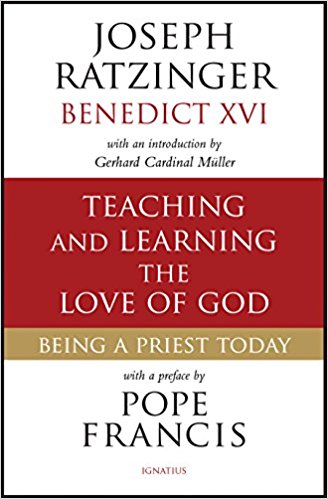 | Teaching and Learning the Love of God: Being a Priest Today by Joseph Ratzinger. Introduction by Gerhard Cardinal Müller. Forward by Pope Francis. Ignatius Press (August 1, 2017). 392 pgs. This inspiring collection of homilies delivered by Joseph Ratzinger (Benedict XVI) over six decades offers deep theological and historical insights on the meaning of the life and the witness of a Catholic priest. When Pope Benedict XVI inaugurated the Year for Priests in 2009, he did so in conjunction with celebrating the 150th anniversary of the death of John Vianney, the patron saint of all parish priests. Benedict's purpose for that special year is the same purpose of this book of homilies -- to deepen the commitment of all priests to interior renewal for the sake of a stronger and more incisive witness to the Gospel in today's world. As St. John Vianney would often say, "The priesthood is the love of the heart of Jesus." This touching expression makes us reflect on the immense gift that priests represent, not only for the Church but for all mankind. Contemporary men and women need priests to be distinguished by their determined witness to Christ. These homilies are meant to illuminate and to inspire priests to renew their commitment to "teaching and learning the love of God". The homilies cover a wide variety of important topics on the priesthood, all deeply rooted in Scripture, including acting in persona Christi, becoming an offering with Christ for the salvation of mankind, being there for God's mercy, and witnessing Christian joy. |
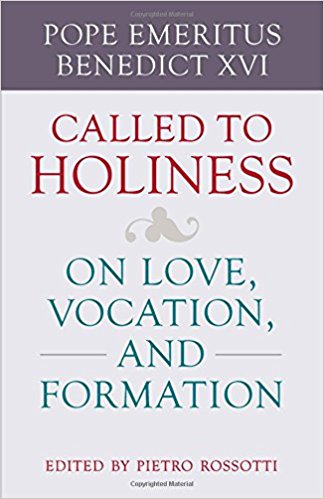 | Called to Holiness: On Love, Vocation, and Formation by Pope Emeritus Benedict XVI. The Catholic University of America Press (April 4, 2017). 272 pgs. This edited collection is the first to gather in one volume the most relevant addresses, speeches, and homilies of His Holiness, Pope Emeritus Benedict XVI to seminarians and consecrated men and women into a single volume for the English-speaking world. Called to Holiness is divided into three sections. The first section focuses on the mystery of vocation. The second section collects Benedict's writings around the crucial experience of Love. Finally, the third section covers Benedict's description of what a seminary should look like. Pope Benedict XVI's words remind us of the fundamental meaning of a life of total consecration to God in a time of history where God is very much rejected. Moreover, in times where young people seek words of wisdom and certainty, Benedict XVI's words give a fundamental aid to such direction not only for people already pondering a vocation to consecration but for all men and women open to God's voice. |
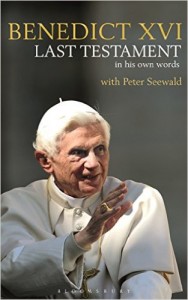 | Last Testament: In His Own Words by Pope Benedict XVI, Peter Seewald (interviewer) Bloomsbury Continuum (November 15, 2016) 224pp. Pope Benedict made history by being the first Pope in over 700 years to resign from office. The Catholic Church the world over was stunned. Worn out by corruption in the Church and by an endless series of clerical sex scandals, he decided that the resolution of all these problems was outside his power for a man of his age. Last Testament is nearest to an autobiography from the shy and private man who has remained “hidden to the world” in a former convent in the Vatican gardens. He breaks his silence on issues such as:
|
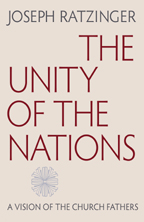 | The Unity of the Nations: A Vision of the Church Fathers The Catholic University of America Press (March 16, 2015) What did ancient Christians and pagans believe makes the unity of the nations? Just as he began serving as a major adviser at the Second Vatican Council in 1962, Joseph Ratzinger (the future Pope Benedict XVI) studied this question in lectures delivered at Austria's University of Salzburg. These lectures, originally published in German, are now made available in English in this volume. According to Ratzinger, pagan Rome said the Empire was the "cosmopolis" which united the world. The church affirmed the goodness of the world, and acknowledged the proper role of the state. But Christian belief that Christ had given birth to the church, the eternal cosmopolis, present now, was revolutionary. Christ was the New Adam, who restores unity to a humanity scattered in the Fall and at Babel. For Origen, Israel was the true state that remained under the one God; other nations were under archons or dark angels, from which Christ came to liberate them. Christ instituted the eternal kingdom of peace, to which Christians belong now, living within and at the service of, their earthly nations. In Ratzinger's view, Origen thought peace between the church and world before the Eschaton - the eternal kingdom - was possible. Augustine responded in two ways to claims by pagans that the Christian God had not protected Rome from being sacked in 410. First, Rome's pagan civic religion was undermined in its function of aiding state security by the fact that it was not true. Second, Christianity, as the truth, was not subordinate to the state, but was a new community. In Ratzinger's view, Augustine saw the church, the City of God, as an alien citizen, but one very much within the City of Man and meant to renew, not take over, that earthly city, until Christ's Second Coming. This early work of Ratzinger's showcases the development of his theology, including themes that will inform his life's work, such as how God's transcendence and the doctrine of creation inform a Christian worldview, and the central role of the Incarnation in understanding how the church relates to the world. |
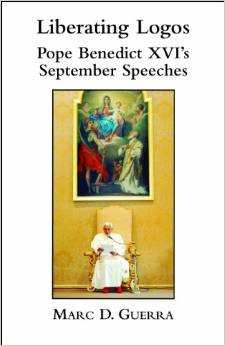 | Liberating Logos: Pope Benedict XVI's September Speeches St. Augustine's Press (15 Sep 2014). Liberating Logos: Pope Benedict XVI’s September Speeches brings together six important addresses in one volume. The themes of these remarkable speeches are wide ranging: Benedict comments on the denaturing effects of Dehellenization, the true grounds of religious dialogue, the transpolitical and timeless nature of Christianity’s message, the relation of moral and political freedom to truth, the self-limitation of modern reason, and Europe’s and the West’s enduring Christian roots. Each speech offers an unwavering defense of the splendor and majesty of created human reason’s ability to know—and to be liberated by—the uncreated Truth. |
 | The Garden of God: Toward a Human Ecology The Catholic University of America Press (April 2014). 232 pages. Genesis, the first book of the Bible, tells of the creation of the world and our dominion over it. But is this the whole storyfi The planet on which we live is ecologically fragile, and all people of good will have a respon- sibility to take care of this most precious gift. During his papacy, Pope Benedict XVI repeatedly drew attention to the environment, whether in terms of preserving it -- such as his address concerning Amazonia and his letter regarding the Arctic -- or distributing its vital resources -- such as water -- more equitably. What is more, during Benedict’s papacy, the Vatican became the first, and remains the only, carbon-neutral country in the world. This book gathers together the audiences, addresses, letters, and homilies of Benedict on a wide-ranging set of topics that deal with the world about us. The major themes and connections he explores are cre- ation and the natural world; the environment, science, and technology; and hunger, poverty, and the earth’s resources. In these pages, Benedict insists that if we truly desire peace, we must be increasingly conscious of and nurture all of creation. Further- more, he argues convincingly that as our love of God should cause us to protect the environment, so should our heightened sense of appre- ciation of the natural world draw us closer to God. Benedict speaks out against the spread of nuclear weapons, threats to biodiversity, and in favor of alternative energy. He urges sustainable development, equita- ble distribution of food and water, and an end to hunger. This book is a valuable resource for all those who seek to under- stand more fully the relationships among the environment, Catholic social teaching, and theology. Whether speaking to a vast crowd, meet- ing with a small group of scientists, or writing letters to world leaders, Benedict has shown a clear path towards a theologically cogent con- cern for the planet on which we live. |
 | Joseph Ratzinger in Communio, Vol. 2: Anthropology and Culture (Ressourcement: Retrieval and Renewal in Catholic Thought) by Pope Benedict XVI. Edited by David Schindler and Nicholas J. Healy. Wm. B. Eerdmans Publishing Company (January 2013) 207 pages. In this second volume of Joseph Ratzinger in Communio, Pope Benedict XVI speaks to various issues relating to humanity today -- conscience, technological security, the origin of human life, the meaning of Sunday, Christian hope, and more. As editor David L. Schindler notes, "Cardinal Ratzinger (Pope Benedict XVI) rarely writes on any churchly matter that does not manifest its implications for man and culture, and vice versa. Indeed, this indissoluble linking is one of the main distinguishing features of his theology." This is the second of three volumes; the first deals with themes relating to the Church, and the third volume is to focus on theological renewal. |
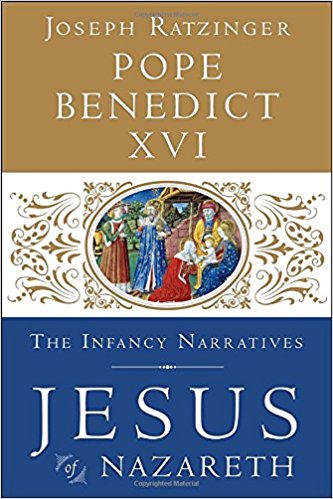 | Jesus of Nazareth: The Infancy Narratives Image Press, November 21, 2012. In 2007, Joseph Ratzinger published his first book as Pope Benedict XVI in order “to make known the figure and message of Jesus.” Now, the Pope focuses exclusively on the Gospel accounts of Jesus’ life as a child. The root of these stories is the experience of hope found in the birth of Jesus and the affirmations of surrender and service embodied in his parents, Joseph and Mary. This is a story of longing and seeking, as demonstrated by the Magi searching for the redemption offered by the birth of a new king. It is a story of sacrifice and trusting completely in the wisdom of God as seen in the faith of Simeon, the just and devout man of Jerusalem, when he is in the presence of the Christ child. Ultimately, Jesus’ life and message is a story for today, one that speaks to the restlessness of the human heart searching for the sole truth which alone leads to profound joy. |
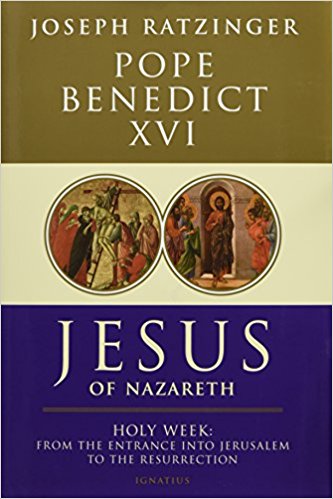 | Jesus of Nazareth: Holy Week: From the Entrance Into Jerusalem To The Resurrection Ignatius Press; 1st American Edition edition (March 10, 2011) 384 pages. For Christians, Jesus of Nazareth is the Son of God, who died for the sins of the world, and who rose from the dead in triumph over sin and death. For non-Christians, he is almost anything else-myth, a political revolutionary, a prophet whose teaching was misunderstood or distorted by his followers. Jesus of Nazareth is the Son of God, and no myth, revolutionary, or misunderstood prophet, insists Benedict XVI. He thinks that the best of historical scholarship, while it can't "prove" Jesus is the Son of God, certainly doesn't disprove it. Indeed, Benedict maintains that the evidence, fairly considered, brings us face-to-face with the challenge of Jesus-a real man who taught and acted in ways that were tantamount to claims of divine authority, claims not easily dismissed as lunacy or deception. Benedict XVI presents this challenge in his new book, Jesus of Nazareth: Holy Week: From the Entrance into Jerusalem to the Resurrection, the sequel volume to Jesus of Nazareth: From the Baptism in the Jordan to the Transfiguration. Why was Jesus rejected by the religious leaders of his day? Who was responsible for his death? Did he establish a Church to carry on his work? How did Jesus view his suffering and death? How should we? And, most importantly, did Jesus really rise from the dead and what does his resurrection mean? The story of Jesus raises these and other crucial questions. Benedict brings to his study the vast learning of a brilliant scholar, the passionate searching of a great mind, and the deep compassion of a pastor's heart. In the end, he dares readers to grapple with the meaning of Jesus' life, teaching, death, and resurrection. Jesus of Nazareth: Holy Week: From the Entrance into Jerusalem to the Resurrection challenges both believers and unbelievers to decide who Jesus of Nazareth is and what he means for them. |
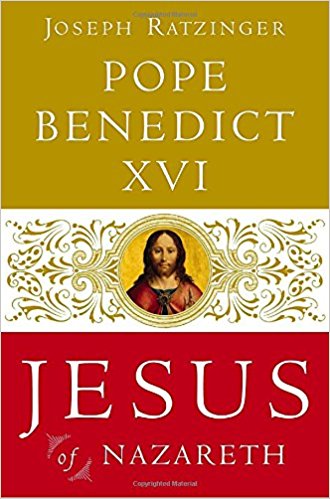 | Jesus of Nazareth: From the Baptism in the Jordan to the Transfiguration Doubleday; 1st edition (May 15, 2007) 374 pages. In this bold, momentous work, the pope—in his first book written as Benedict XVI—seeks to salvage the person of Jesus from recent “popular” depictions and to restore Jesus’ true identity as discovered in the Gospels. Through his brilliance as a theologian and his personal conviction as a believer, the pope shares a rich, compelling, flesh-and-blood portrait of Jesus and incites us to encounter, face-to-face, the central figure of the Christian faith. From Jesus of Nazareth :the great question that will be with us throughout this entire book: But what has Jesus really brought, then, if he has not brought world peace, universal prosperity, and a better world? What has he brought? The answer is very simple: God. He has brought God! He has brought the God who once gradually unveiled his countenance first to Abraham, then to Moses and the prophets, and then in the wisdom literature—the God who showed his face only in Israel, even though he was also honored among the pagans in various shadowy guises. It is this God, the God of Abraham, of Isaac, and of Jacob, the true God, whom he has brought to the peoples of the earth. He has brought God, and now we know his face, now we can call upon him. Now we know the path that we human beings have to take in this world. Jesus has brought God and with God the truth about where we are going and where we come from: faith, hope, and love." |
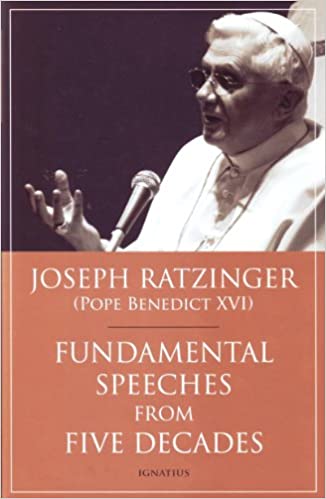 | Joseph Ratzinger: Fundamental Speeches from Five Decades Ignatius Press (March 2012) While a professor of theology and throughout his rise in the Roman Catholic hierarchy, Joseph Ratzinger again and again delivered important speeches over the course of five decades at the Catholic Academy of Bavaria (1963-2004). The broad spectrum of topics from the primacy of the papacy to the moral foundations of western society demonstrated not only his breadth of knowledge but also his prescience, for these issues remain important for both the Church and modern man. The fundamental speeches in this volume are arranged thematically. And before each one is a brief introduction written by Dr. Florian Schuller, the director of the Catholic Academy of Bavaria in Munich, who also contributed the foreword. |
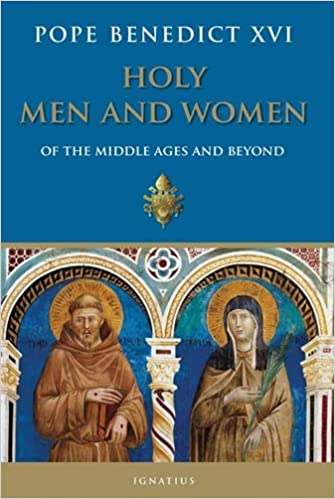 | Holy Men and Women Of the Middle Ages and Beyond Ignatius Press (March 2012) While a professor of theology and throughout his rise in the Roman Catholic hierarchy, Joseph Ratzinger again and again delivered important speeches over the course of five decades at the Catholic Academy of Bavaria (1963-2004). The broad spectrum of topics from the primacy of the papacy to the moral foundations of western society demonstrated not only his breadth of knowledge but also his prescience, for these issues remain important for both the Church and modern man. The fundamental speeches in this volume are arranged thematically. And before each one is a brief introduction written by Dr. Florian Schuller, the director of the Catholic Academy of Bavaria in Munich, who also contributed the foreword. |
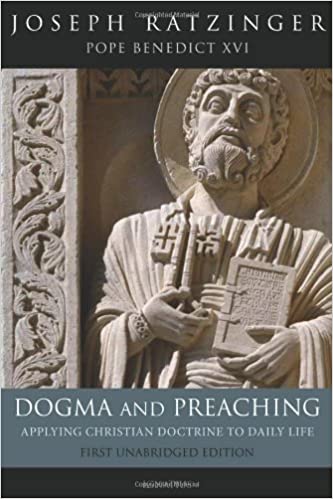 | Dogma and Preaching: Applying Christian Doctrine to Daily Life Ignatius Press (October 1, 2011) This volume is an unabridged edition of Dogma and Preaching, a work that appeared in a much-reduced form in English, in 1985. The new book contains twice as much material as first English edition. "Dogma", for many people, is a bad word. For the well-informed believer, it shouldn't be. Dogmas are truths revealed by God, which should enlighten the minds, guide the choices, and gladden the hearts of Jesus' disciples, including pastors, deacons, and lay teachers. But, as Joseph Ratzinger (Pope Benedict XVI), notes in the foreword to this book, "The path from dogma to proclamation or preaching has become very troublesome." Finding ways to relate the content of the Church's dogmas to everyday life can be challenging for today's preachers and teachers. Some people find the task so daunting that they leave dogma out. As a result, they wind up presenting something other than the Church's faith and speak in their own name, offering perhaps unwittingly merely their own, subjective ideas, rather than the Word of God. In Dogma and Preaching, the theologian and priest Joseph Ratzinger provides (1) a theory of preaching for today; (2) application of this theory to some themes for preaching drawn from the Church's dogmas; (3) meditations and sermons based on the liturgical year and the communion of saints; and (4) some thoughts regarding the decade after the Second Vatican and Christianity's seeming irrelevance. Ratzinger insists that sound preaching should rest on three pillars -- Dogma, Scripture, and the Church Today, the contemporary situation in which the Church finds herself. He shows that the proper understanding of the Church, her dogmas, the nature of faith, and the contemporary world allow the proclaimer-believer to remain faithful to the Church's mission and life-changing message. |
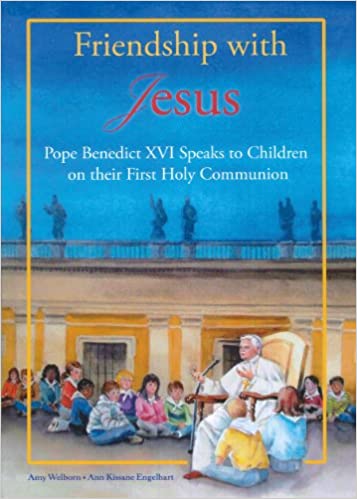 | Friendship with Jesus: Pope Benedict XVI Talks to Children on Their First Holy Communion Ignatius Press (October 1, 2011) To receive Jesus in Holy Communion is to enter into a lifelong friendship with him. In this beautifully illustrated book, Amy Welborn, well-known author and blogger, introduces Pope Benedict's profound yet simple answers to various questions put to him by children in Rome who had recently made their First Holy Communion. Pope Benedict's answers, and the children's wonderful questions concerning this very important spiritual occasion in their young lives, provide inspiring text for this beautiful gift book for First Communion. |
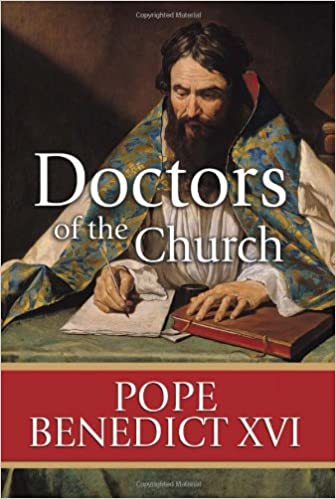 | Doctors of the Church Our Sunday Visitor (September 27, 2011) They are saints and teachers, monks, priests, bishops, and nuns. They faced opposition and exile. They lived in periods of confusion and conflict. Their teachings and insights not only brought peace and understanding to the Church of their time, but continue to anchor the Church of today. They brought clarity to the fragments and simplicity to the complex. They used speeches, documents, poems, and songs to reach the people of their time. Now Pope Benedict XVI explores the lives and significance of thirty-two of the Doctors of the Church like no one else can. Taken directly from the pope's addresses in his weekly audiences, Doctors of the Church is an incredible journey through time to better understand these individuals who explored and explained the critical questions of the Church. ---Who is Christ? |
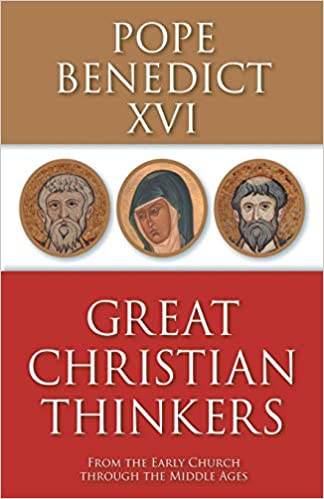 | Great Christian Thinkers: From the Early Church Through the Middle Ages Augsburg Fortress Publishers (July 1, 2011) In brief portraits, Pope Benedict XVI offers engaging, perceptive, and edifying sketches of some of the great thinkers and writers of Christianity, from early Christianity through the high Middle Ages. Pope Benedict discusses notable theologians from East and West but also many figures whose primary witness was as ascetics, poets, mystics, and missionaries. Always with an eye to their deepest religious convictions and struggles, the Holy Father presents these great thinkers importance for the church and for Christian life today. |
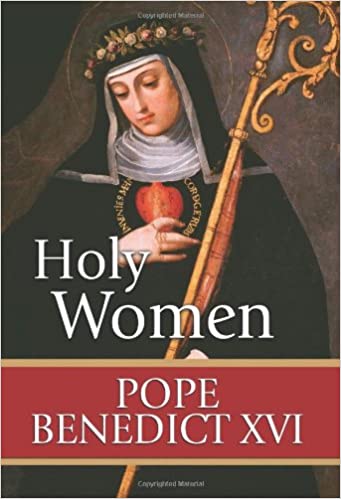 | Holy Women Our Sunday Visitor (June 28, 2011) Women have always played a unique and critical role throughout Scripture which has continued through today. In his weekly addresses, Pope Benedict XVI expertly and thoughtfully explores the life stories of 17 such holy women. From St. Hildegard of Bingen to St. Teresa of Avilla to St. Joan of Arc and many more in between, each one brings a fresh experience and example of faith that is still relevant today. These models of prayer, faith, and action will help you gain a fuller understanding of Church history as well as personal faith. Bring your faith to life with the spark of history as told by the pope himself. |
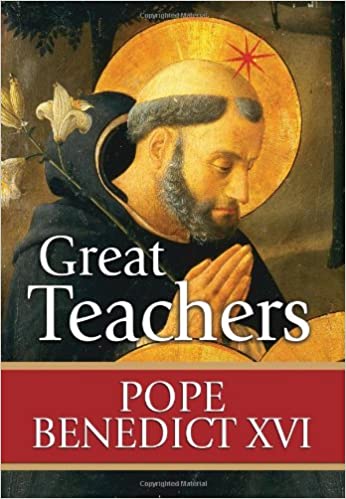 | Great Teachers Our Sunday Visitor (March 28, 2011) Discover the greatest teachers of the Faith as Pope Benedict XVI highlights their essential role during a time of scandal and strife in the Church. Focusing specifically on the 13th-century founding of the Franciscans by St. Francis of Assisi and the Dominicans by St. Dominic, the pope said personal holiness led the two saints to preach and to help actualize a return to Gospel poverty, a deeper unity with the Church, and a new movement of evangelization, including within the European universities that were blossoming at the time. The Franciscans and Dominicans followed in the footsteps of their founders and demonstrated that it was possible to live evangelical poverty, to live the Gospel itself, without separating themselves from the Church, he said. Their example continues to be relevant today as we struggle with a culture that focuses more on having than on being, and look to emulate those holy people who chose to live very simply. |
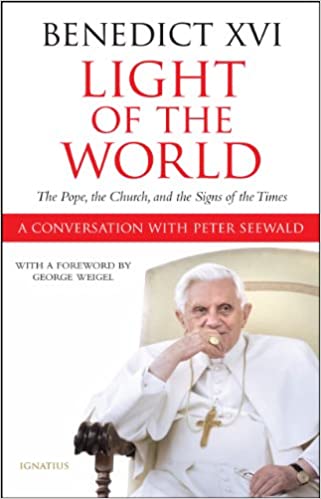 | Light of the World: The Pope, The Church and the Signs of the Times Pope Benedict XVI | Peter Seewald. Introduction by George Weigel. Ignatius Press (November 24, 2010) Never has a Pope, in a book-length interview, dealt so directly with such wide-ranging and controversial issues as Pope Benedict XVI does in Light of the World. Taken from a recent week-long series of interviews with veteran journalist Peter Seewald, this book tackles head-on some of the greatest issues facing the world of our time. Seewald poses such forthright questions to Pope Benedict as:
|
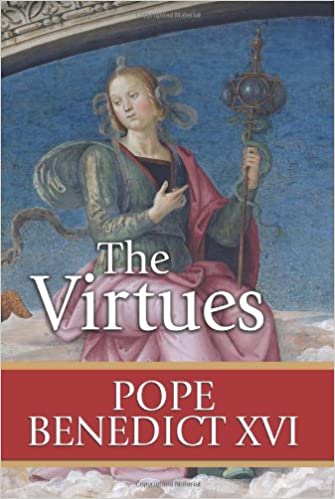 | The Virtues Our Sunday Visitor (October 2010) "...The truly great thing in Christianity, which does not dispense one from small, daily things but must not be concealed by them either, is this ability to come into contact with God." ---Pope Benedict XVI One of the greatest teachers of our day, Pope Benedict XVI has frequently spoken about the pursuit of virtue. In these selections from homilies and addresses, the Holy Father draws on the lives of saints, the Catechism, and common experiences to bring us into a deeper understanding of the virtues and how to cultivate them in our own lives so that we can grow closer to the Lord. Allow Pope Benedict XVI to instruct you on nurturing all the basic Christian virtues: Faith, Hope, and Charity, called the Theological Virtues and Prudence, Fortitude, Justice, and Temperance the Cardinal Virtues. A virtue is a habitual and firm disposition to do the good. It allows the person not only to perform good acts, but to give the best of himself. The virtuous person tends toward the good with all his sensory and spiritual powers; he pursues the good and chooses it in concrete actions. Catechism of the Catholic Church (1803) |
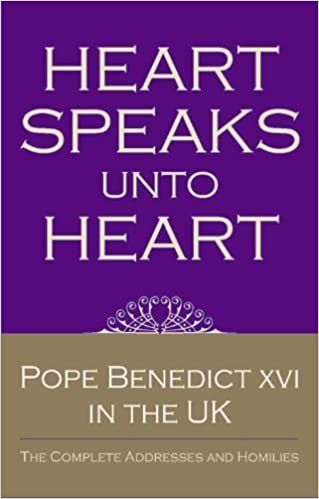 | Heart Speaks to Heart: Sermons and Addresses of Benedict XVI in the UK Darton,Longman & Todd Ltd (September 2010) In advance of his historic visit in September 2010, Pope Benedict XVI prepared several important addresses on religion and society, on education, and on the contribution made by the Catholics of the United Kingdom to the story of the Church. Heart Speaks to Heart collects together the complete texts of all the sermons, talks and addresses given during his four-day visit to Britain, which reaches its climax with the ceremonies at Cofton Park in Birmingham for the beatification of Cardinal John Henry Newman. |
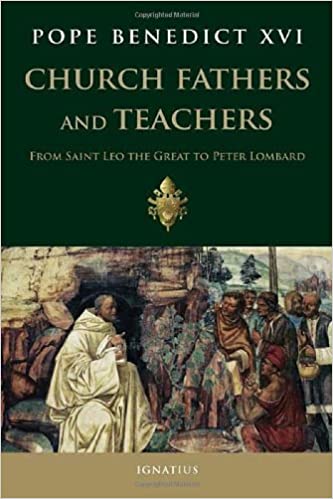 | Church Fathers and Teachers: From Leo the Great to Peter Lombard Ignatius Press (May 10, 2010) After meditating on the Apostles and then on the Fathers of the early Church, as seen in his earlier works Jesus, the Apostles and the Early Church and Church Fathers, Pope Benedict XVI devoted his attention to the most influential Christian men from the fifth through the twelfth centuries. In his first book, Church Fathers, Benedict began with Clement of Rome and ended with Saint Augustine. In this volume, the Holy Father reflects on some of the greatest theologians of the Middle Ages: Benedict, Anselm, Bernard, and Gregory the Great, to name just a few. By exploring both the lives and the ideas of the great popes, abbots, scholars and missionaries who lived during the fall of the Roman Empire and the rise of Christendom, Pope Benedict XVI highlights the key elements of Catholic dogma and practice that remain the foundation stones not only of the Roman Catholic Church but of Christian society itself. This book is a wonderful way to get to know these later Church Fathers and Teachers and the tremendous spiritually rich patrimony they have bequeathed to us. |
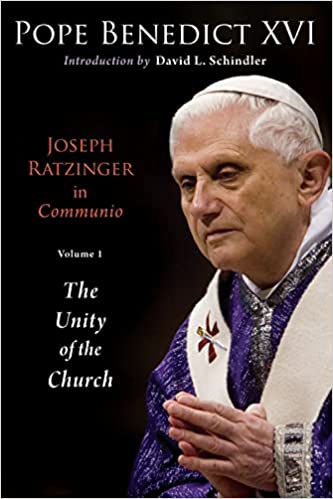 | Joseph Ratzinger in Communio: Vol. 1, The Unity of the Church (Ressourcement: Retrieval and Renewal in Catholic Thought) W. B. Eerdmans Publishing Company (February 22, 2010) The Unity of the Church brings together a captivating collection of articles — previously published in Communio — by Pope Benedict XVI. The essays deal with various issues facing the church in the world today, including what divides and unites denominations, the growing crisis facing peace and justice, technological security, and the necessity of ecumenism in the growth of the church. / “Pope Benedict XVI rarely writes on any churchly matter that does not manifest its implications for man and culture, and vice versa,” notes David Schindler in the introduction. This collection is a brilliant expression of that tendency toward interconnectivity. / Dwelling in Love is part of the Ressourcement: Retrieval and Renewal in Catholic Thought series, edited by David L. Schindler. |
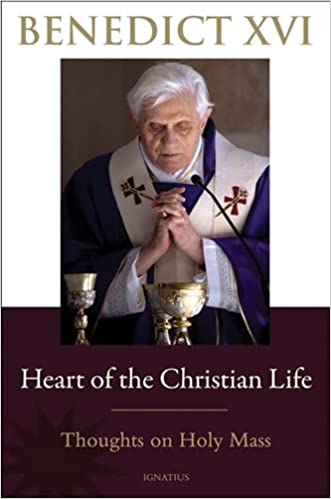 | Heart of the Christian Life: Thoughts on the Holy Mass Ignatius Press (March 1, 2010) The celebration of the Eucharist, in which Jesus Christ becomes present, is the center of the Catholic faith. This volume brings together substantive texts of the Holy Father on the many aspects and dimensions of the Mass and the Mystery of the Eucharist, a rich source for every Christian and a spur to reflection and personal prayer. Delivered in addresses and homilies to a wide variety of audiences , these reflections reveal the depth and breadth of Pope Benedict XVI’s profound and life-long love for the Holy Eucharist. A major theme throughout the works of Joseph Ratzinger, the Real Presence of Jesus in the Eucharist is the Church’s source of life, unity and fruitfulness. This theme has been carried deeply into his pontificate, as can be seen in this collection, which challenges the faithful to believe that by receiving Christ in Holy Communion, they are drawn not only into the very life of God, but into the community that is Christ’s Body, the Church. |
 | The Ratzinger Reader Lieven Boeve (Editor), Gerard Mannion (Editor). Continuum (March 2010) A fascinating and insightful volume collecting together the key writings of Joseph Ratzinger, some of them yet untranslated, from his youthful and more progressive writings, to his ‘transition period’ following his disillusionment with the aftermath of Vatican II, to his time as Prefect of the Vatican’s Congregation for the Doctrine of the Faith down to 2005. The emphasis will be upon Joseph Ratzinger as ‘private theologian’, his many writings released in a personal capacity for such will chart the formation of and comment upon the official statements and texts released under his name in a more informative fashion than the simple inclusion of the formulaic ‘official texts’ themselves. Following a section providing insight into the fundamental and systematic theological background and development of Joseph Ratzinger’s thought, further thematic sections will also be included, for example, Joseph Ratzinger’s writings on Ecclesiology, on Theology and the Role of Theologians, on the Eucharist, on Religious Pluralism, on Sacramental Theology, Ecumenism, on Truth, on the Contemporary Historical Era, on Magisterium and on Faith Morals etc. The volume will open with an introductory essay charting the life and career, the achievements of and the controversies surrounding the new pope. Each reading will be prefaced by a brief introduction to its context and themes and will be followed by recommended further reading on its respective subject matter. |
 | Meeting Saint Paul With the Pope: Wednesday Audiences During the Pauline Jubilee Year Paulist Press (November 2009) A series of twenty-one reflections of Pope Benedict XVI on one of the most influential persons in the history of Christianity, Saint Paul. |
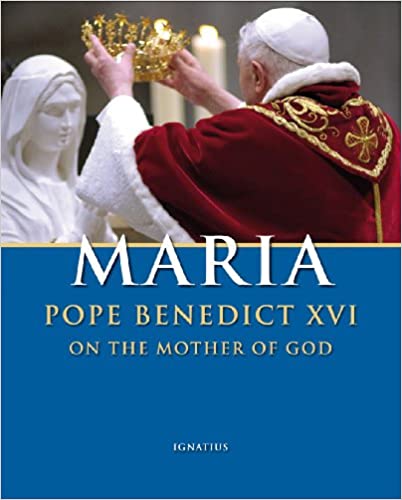 | Maria: Pope Benedict XVI on the Mother of God Ignatius Press (November 2009) This glorious volume is a lavishly illustrated coffee-table book with dozens of inspirational and famous color paintings, sculptures and artwork of the Blessed Virgin Mary from all over the world. The beautiful pictures are accompanied by the profound writings and homilies of Pope Benedict XVI on the person of Mary, and her unique role in human history and in the plan of God for salvation history. The gorgeous paintings and artwork are from many different centuries, some very famous and others less well-known. Many of these artworks are located at popular Marian shrines that Pope Benedict has visited and honored with special events, prayers and homilies, depicted throughout this volume. Some of the famous Marian images include Our Lady of Lourdes, Our Lady of Czestochowa (the ''Black Madonna''), Queen of the Holy Rosary, Our Lady of Loreto, Queen of Carmel, and many others. Pope Benedict offers in-depth, inspirational reflections on the unique spiritual role Mary as the Mother of the Savior, showing her to be the universal ''Woman'' that Jesus calls her in the Gospels, his mother that God made the spiritual mother of all mankind. Using Biblical references of Mary as ''full of grace'' and the ''woman clothed with the sun'', Pope Benedict emphasizes that Mary's main role is to lead us to union with Jesus, to help us know and love Him much better and to be his true followers. |
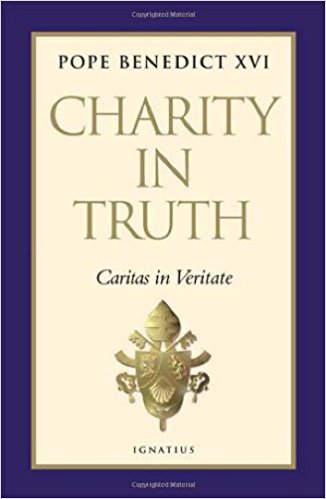 | Charity in Truth: Caritas in Veritate Ignatius Press (August 2009). Pope Benedict’s third encyclical, Charity in Truth (Caritas in Veritate), applies the themes of his first two encyclicals —love and hope (God Is Love, Saved in Hope) — to the world’s major social issues. Drawing on moral truths open, in principle, to everyone (the natural law) as well as on the teachings of the gospel (revelation), Pope Benedict addresses Catholics and non-Catholics alike, challenging us all to recognize and then to confront the social evils of our day. The first part of the encyclical examines the dynamic teaching of Benedict’s predecessors, Pope Paul VI and Pope John Paul II. Both men contributed greatly to the body of doctrine known as “Catholic social teaching”. Both men challenged the simplistic division of political perspectives into “conservative” and “liberal”, and “right” and “left”. Both men were convinced that the natural moral law and the teaching of the Gospel were indispensable for a world in desperate search of hope and meaning. In the second part Benedict surveys the social issues that confront the human race today—assaults on the dignity of the human person such as the attack on human life, poverty, issues of war and peace, terrorism, globalization, and environmental concerns. Benedict provides sound moral principles to address these social and economic problems, and to promote a culture of life and genuine peace. In this outstanding work, Pope Benedict shows us why so many observers regard him as the world’s leading moral voice, as well as one of the most insightful and profound social/political thinkers of our day. |
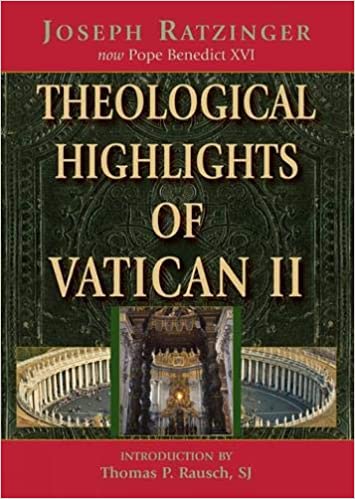 | Theological Highlights of Vatican II Paulist Press (March 2009) Here is a significant book comprising Joseph Ratzinger's report on the debates and struggles that made up each of the four sessions of Vatican II (1962-65), along with theological commentary by a noted scholar and professor. At the council Ratzinger worked on the Dogmatic Constitution on Divine Revelation (Dei verbum), the Dogmatic Constitution on the Church (Lumen Gentium), and the Decree on the Missionary Activity of the Church (Ad gentes). Topics he treats in detail in the book include the debate on the liturgy schema, the early debate on divine revelation, the questions of Mariology and ecumenism, the decree on the bishops office in the Church, religious liberty, the Church and the Jews, and the schemas on the missions and on priestly ministry and life. He gives special attention to the Dogmatic Constitution on the Church and to the Pastoral Constitution on the Church in the Modern World. |
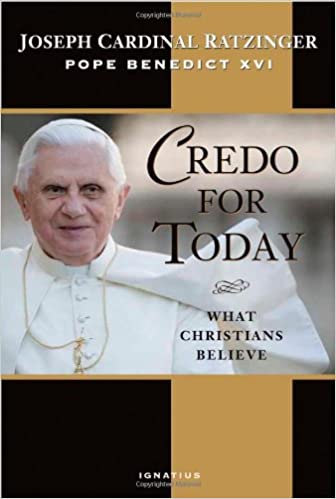 | Credo for Today: What Christians Believe Ignatius Press (May 2009). What do Christians believe? What gives meaning to our life? What is the purpose of life? The Christian answer to these questions is found in the Creed, in the profession of faith. But what do the articles of this confession actually mean? And how to they affect our lives? Joseph Ratzinger, now Pope Benedict XVI, takes a fresh look at these timeless questions. This work is a reflection of the profound, personal insights of Benedict XVI, but also of the great foundations of Christianity: faith, hope, and charity. Ratzinger writes eloquently and persuasively about the importance for followers of Christ to understand well what they believe so one can live as a serious Christian in today’s secular world. He talks in depth about the true meaning of faith, hope, and love—the love of God and the love of neighbor. He also discusses the crucial importance of a lived faith, for the believer himself as well as being a witness for our age, and striving to bring faith in line with the present age that has veered off into rampant secularism and materialism. "In our generation the Christian Faith finds itself in a much deeper crisis than at any other time in the past. In this situation it is no solution to shut our eyes in fear in the face of pressing problems, or to simply pass over them. If faith is to survive this age, then it must be lived, and above all, lived in this age. And this is possible only if a manifestation of faith is shown to have value for our present day, by growing to knowledge and fulfillment." —Pope Benedict XVI |
 | Faith and the Future Ignatius Press (March 2009). Increasingly, the future is becoming a theme for theological reflection. In the background we can detect a growing concern among many people for the future of faith. Does faith have any future at all, and, if so, where in all the confusion of today's trends will we discover its embryo? But the problem of the future assails not only the believer. In the ever more rapidly advancing process of historical evolution, man is confronted with enormous opportunities, but also with colossal perils. For him, the future is not only hope, but sorrow—a nightmare, indeed. He cannot avoid asking what part faith can play in building tomorrow's world. Joseph Ratzinger, now Pope Benedict XVI, approaches this problem of universal concern from a variety of angles, bringing his deep personal faith and theological brilliance to bear on these serious questions. |
 | Saint Paul Ignatius Press (April 2009). St. Paul is one of the most important figures in Christian history. As Saul of Tarsus he vigorously persecuted Christianity, even collaborating in the death of Christianity’s first martyr, Stephen. His encounter with the resurrected Jesus on the road to Damascus changed Paul’s life, the Christian Church, and world history. More than anyone else in the early Church, Paul saw the universal nature of the Christian message. He became the “Apostle to the Gentiles” and the “Teacher of the Nations”. As the human author of half of the New Testament, Paul is a figure who cannot be overlooked by anyone who wants to understand Jesus Christ and Christianity. In this book, Pope Benedict XVI, a profound spiritual leader in his own right and a first-rate theologian and Bible commentator, explores the legacy of Paul. Pope Benedict follows the course of the Apostle’s life, including his missionary journeys and his relationship with the other apostles of Jesus such as St. Peter and St. James, and Paul’s martyrdom in Rome. Benedict also examines such questions as: Did Paul know Jesus during his earthly life and how much of Jesus’ teaching and ministry did he know of? Did Paul distort the teachings of Jesus? What role did Jesus’ death and resurrection play in Paul’s teaching? What are we to make of Paul’s teaching about the end of the world? What does Paul’s teaching say about the differences between Catholic and Protestant Christians over salvation and the roles of faith and works in the Christian life? How have modern Catholic and Protestant scholars come together in their understanding of Paul? What does Paul have to teach us today about living a spiritual life? These and other important issues are addressed in this masterful, inspirational, and highly-readable presentation of St. Paul and his writings by one of today’s great spiritual teachers, Pope Benedict XVI. |
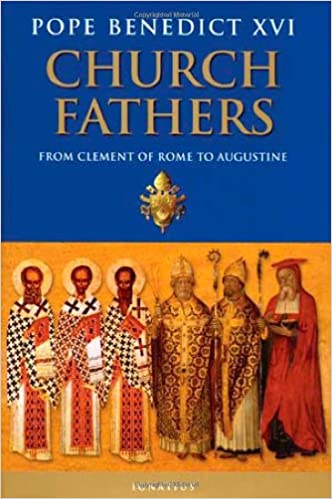 | The Church Fathers: From Clement of Rome to Augustine Ignatius Press (October 30 2008). Following his best selling book, Jesus of Nazareth, and his talks published in Jesus, the Apostles, and the Early Church, Pope Benedict's Church Fathers presents these important figures of early Christianity in all their evangelical vitality, spiritual profundity, and uncompromising love of God. Benedict tells the true story of Christianity's against-all-odds triumph in the face of fierce pagan Roman hostility and persecution. He does this by exploring the lives and the ideas of the early Christian writers, pastors, and martyrs, the men so important to the spread of Christianity that history knows them as "the Fathers of the Church". This rich and engrossing survey of the early Church includes those churchmen who immediately succeeded the Apostles, the "Apostolic Fathers": Clement of Rome, Ignatius of Antioch, Justin Martyr, and Irenaeus of Lyon. Benedict also discusses such great Christian figures as Tertullian, Origen, and Cyprian of Carthage, the Cappadocian Fathers, as well as the giants John Chrysostom, Jerome, Augustine, Leo the Great, and Benedict of Nursia, the Pope's namesake. This book is a wonderful way to get to know the Church Fathers and the tremendous spiritually rich patrimony they have bequeathed to us. |
 | Pope Benedict In America: The Full Texts of Papal Talks Given During His Apostolic Visit to the United States with introduction by Fr. James V. Schall. Ignatius Press (May 2008). During his six-day apostolic visit to Washington and New York, Pope Benedict addressed millions of people--in person or via the media. He gave some fifteen major addresses, ranging from his remarks to the President of the United States, to his address to ecumenical leaders at St. Joseph Parish in New York, from his speech to the General Assembly of the United Nations, to his message to the Jewish community celebrating the feast of Passover. In all of his addresses, Benedict spoke as the Vicar of Christ, with the message of divine truth and love, of genuine faith and a well-founded, Christ-centered hope. This book contains all of Benedict's major addresses in a handy slim size deluxe hardcover edition perfect for use to study and reflect on the Pope's profound and insightful words on a variety of important spiritual, moral and social issues. Readers will readily see the truth of Jesuit Father James Schall's statement, from his introduction to this volume: "Benedict XVI is an amazingly learned man . . . There is no one else in any public office in the world that has ... his breadth of knowledge and scholarship. Though he speaks the learned German academic tongue with the best of them, his writings are strikingly straightforward and clear . . . One sensed that the media understood this somehow, that this man was on top of every subject and operated at a depth few could match. The papacy does have the duty of teaching and Benedict does teach. He also thinks and ponders. What is characteristic of him is that he not only speaks authoritatively when he must, but that he mostly offers what he says on the grounds of common sense and reason. He goes directly to the minds and hearts of his readers or listeners." |
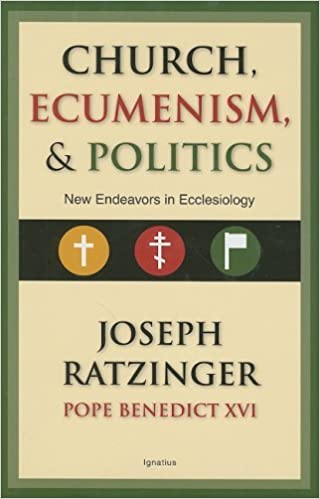 | The Church, Ecumenism and Politics: New Endeavors in Ecclesiology Ignatius Press (April 2008). This work features the most discussed topics of the life of the Church, treated with unique frankness and depth by the Church's spiritual and theological leader. In this collection of essays, theologian Joseph Ratzinger, now Benedict XVI, tackles three major issues in the Church today--the nature of the Church, the pursuit of Christian unity, and the relationship of Christianity to the secular/political power. The first part of the book explores Vatican II's teaching on the Church, what it means to call the Church "the People of God", the role of the Pope, and the Synod of Bishops. In part two, Ratzinger frankly assesses the ecumenical movement--its achievements, problems, and principles for authentic progress toward Christian unity. In the third part of the work, Ratzinger discusses both fundamental questions and particular issues concerning the Church, the state and human fulfillment in the Age to come. What does the Bible say about faith and politics? How should the Church work in pluralistics societies? What are the problems with Liberation Theology? How should we understand freedom in the Church and in society? Beneath a penetrating analysis on these important topics by this brilliant teacher and writer, both concise and also surprising, is revealed the passion of a great spiritual leader. |
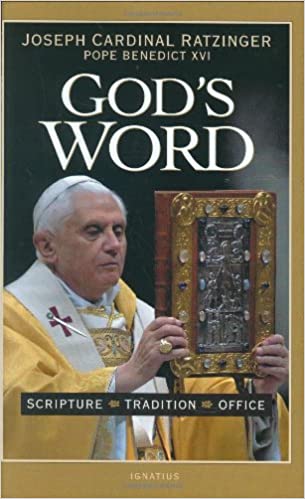 | God's Word: Scripture - Tradition - Office Ignatius Press (March 2008). In this book Joseph Ratzinger, now Pope Benedict XVI, presents the Word of God as a living reality in the Church. God's Word, according to Ratzinger, is encountered in the Bible, in Tradition, and through the teaching Office of the Bishop, who, through apostolic succession, is to be the servant of and witness to the divine Word. Ratzinger examines as well the relationship between the Episcopacy and the Papacy. He also considers the nature of Apostolic Succession, and he responds to Reformed objections to the Catholic view of the subject. His treatment is sympathetic to the concerns of non-Catholic Christians while remaining faithful to Catholic teaching and practice. This book also includes the famous Erasmus Lecture of Cardinal Ratzinger, which assesses the strengths and weaknesses of modern critical approaches to biblical interpretation. Ratzinger proposes a new approach that avoids the pitfalls of a narrowly critical outlook on the Bible without succumbing to fundamentalism. God's Word provides profound insights into Pope Benedict XVI's efforts to renew the Church's participation in God's Truth through the divine Word, as well as the Church's mission to proclaim the Word to all people. |
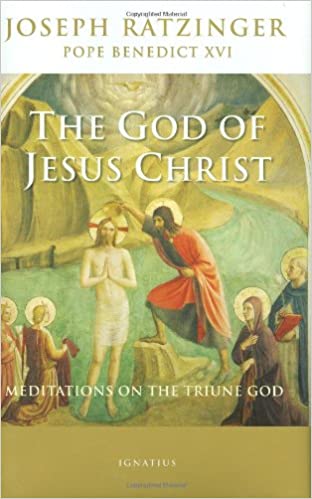 | The God of Jesus Christ: Meditations on the Triune God Ignatius Press (March 2008). In this book of meditations, based on a series of homilies and meditations presented and compiled by the author shortly before he became Archbishop of Munich-Freising, in 1977, theologian Joseph Ratzinger (now Pope Benedict XVI) presents his profound thoughts on the nature and person of God, building a bridge between theology and spirituality as he makes wide use of the Sacred Scriptures to reveal the beauty and mystery of who God is. He writes about each of the three persons in the Holy Trinity, showing the different attributes of each person, and that "God is three and God is one." God is--and the Christian faith adds: God is as Father, Son, and Holy Spirit, three and one. This is the very heart of Christianity, but it is so often shrouded in a silence born of perplexity. Has the Church perhaps gone one step too far here? Ought we not rather leave something so great and inaccessible as God in his inaccessibility? Can something like the Trinity have any real meaning for us? It is certainly true that the proposition that "God is three and God is one" is and remains the expression of his otherness, which is infinitely greater than us and transcends all our thinking and our existence. But, as Joseph Ratzinger shows, if this proposition meant nothing to us, it would not have been revealed! And as a matter of fact, it could be clothed in human language only because it had already penetrated human thinking and living to some extent. "Without Jesus, we do not know what 'Father' truly is. This becomes visible in his prayer, which is the foundation of his being. A Jesus who was not continuously absorbed in the Father, and was not in continuous intimate communication with him, would be a completely different being from the Jesus of the Bible, the real Jesus of history... In Jesus' prayer, the Father becomes visible and Jesus makes himself known as the Son. The unity which this reveals is the Trinity. Accordingly, becoming a Christian means sharing in Jesus' prayer, entering into the model provided by his life, i.e. the model of prayer. Becomng a Christian means saying 'Father' with Jesus, and thus becoming a child, God's son--God--in the unity of the Spirit, who allows us to be ourselves and precisely in this way draws us into the unity of God. Being a Christian means looking at the world from this central point, which gives us freedom, hope, decisiveness, and consolation." |
 | Questions and Answers Our Sunday Visitor (February 2008). Life can be successful only if we have the courage to be adventurous ... Pope Benedict XVI Discover the Pope s insightful, personable, and refreshingly accessible responses to the questions we all want to ask. Live audiences of children, clergy, young adults, and others gain unprecedented access to ask the Pope about everything from divorce and remarriage to the Mass, consumerism, relativism, sacraments, Scripture, music, sex, vocations, and more. |
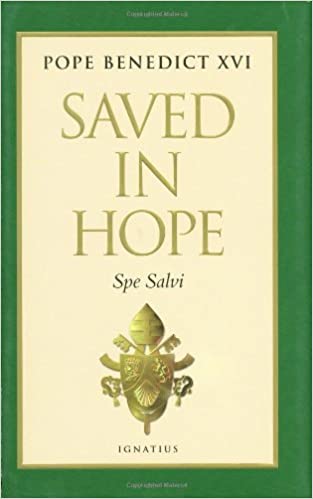 | Saved in Hope (Spe Salvi) Ignatius Press (February 2008) Pope Benedict XVI’s second encyclical, Saved In Hope, (“Spe Salvi” in Latin) takes its title from St. Paul, who wrote, “In hope we have been saved”. In this special deluxe hardcover edition of the work, the Holy Father continues a line of thought he began with his first encyclical, God is Love. Love and Hope are closely related in the spiritual life. Love of God involves hope or trust in God. According to the Catechism of the Catholic Church, “The virtue of hope responds to the aspiration to happiness which God has placed in the heart of every man”. Hope enables us to look to the next life, but it also inspires and purifies our actions in this life. Pope Benedict considers modern philosophies and the challenges of faith today in light of the virtue of hope. “Confronted by today’s changing and complex panorama, the virtue of hope is subject to harsh trials in the community of believers. For this very reason, we must be apostles who are filled with hope and joyful trust in God’s promises. In contemporary society, which shows such visible signs of secularism, we must not give in to despair.” — Pope Benedict XVI |
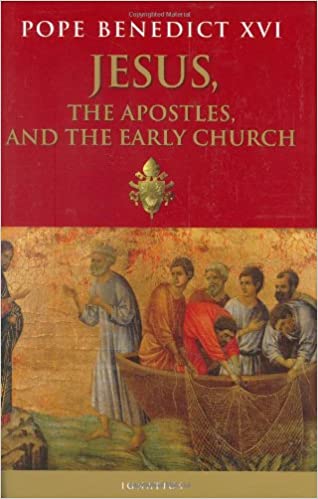 | Jesus, the Apostles and the Early Church Ignatius Press (November 2007). Based on Pope Benedict XVI's weekly teaching on the relationship between Christ and the Church, this book tells the drama of Jesus' first disciples -- his Apostles and their associates -- and how they spread Jesus' message throughout the ancient world. Far from distorting the truth about Jesus of Nazareth, insists Pope Benedict, the early disciples remained faithful to it, even at the cost of their lives. Beginning with the Twelve as the foundation of Jesus' re-establishment of the Holy People of God, Pope Benedict examines the story of the early followers of Christ. He draws on Scripture and early tradition to consider such important figures as Peter, Andrew, James and John, and even Judas Iscariot. Benedict moves beyond the original Twelve to discuss Paul of Tarsus, the persecutor of Christianity who became one of Jesus' greatest disciples. Also considered are Stephen, the first Christian martyr, Barnabas, Timothy, Titus, the wife and husband "team" of Priscilla and Aquila, and such key women figures as Mary, the Mother of Jesus, Mary Magdalene, and Phoebe. |
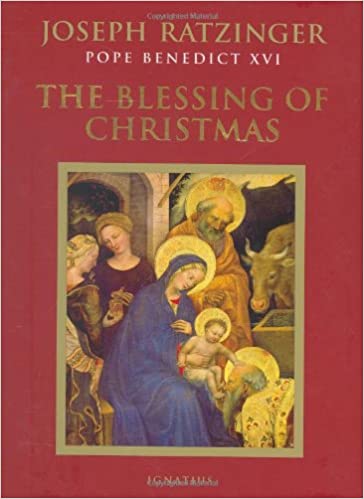 | The Blessing of Christmas: Meditations for the Season Ignatius Press (October 2007). This lovely little book, profusely illustrated, is ideal for the Christmas and Advent season with its inspiring, profound, yet popular meditations on the blessings of the season by the current Pope. Taken from his sermons as well as his writings, these beautiful meditations by the acclaimed spiritual teacher, writer and now Pontiff, give his usual fresh insights into the deeper meaning of this most wondrous event, and show the Pope to be a man who knows how to address both the mind and the heart. |
 | New Outpourings of the Spirit: Movements in the Church Ignatius Press (October 2007). The volume consists of two fundamental texts by Cardinal Ratzinger, now Pope Benedict XVI, on the ecclesial movements and new communities within the Church since the Second Vatican Council. These writings are particularly meaningful with regard to the intense spiritual journey which the ecclesial movements and the new communities are experiencing in view of their meeting with Pope Benedict XVI on Pentecost 2006. These writings are a precious guide for the entire Church, leaders and laity alike, who are invited to welcome the new "outpourings of the Spirit". The first part of the book presents in an articulate and exhaustive way the theological vision of the Pope on these ecclesial movements and the new communities. It is his talk titled Church Movements and their Place in Theology which he gave at the beginning of the World Congress of the Ecclesial Movements in Rome in Ma, 1998. It combines extraordinary theological depth with a warm pastoral tone. The second part of the book is very different from the first, but complements the first part. It contains the dialogue of Cardinal Ratzinger with a large group of Bishops from all continents, convened together for a seminar on the topic, The Ecclesial Movements in the Pastoral Concern of the Bishops held in Rome in 1999.This dialogue format was very favorably received by the Bishops, and it is quite wide-ranging, touching on topics such as the relation between the old and the new charisms, the institutional dimension and the charismatic dimension of the Church, and the Church's mission in a non-Christian society and more. |
 | Seek That Which Is Above: Meditations Through the Year [Reprint] Ignatius Press (September 2007). In this beautifully illustrated book, Cardinal Ratzinger gives us meditations on various Liturgical Seasons and Feasts throughout the year, as well as other interesting spiritual and secular themes. These profound and inspiring thoughts bring his broad theological experience as well as his wide literary interests to his people. Here is a shepherd nourishing spiritually the faithful addressed to his care. Themes the Cardinal covers include Advent, Candlemas, Mardi Gras, Easter, Corpus Christi, Marian Devotion, Vacation & Rest, Peace and Creation. |
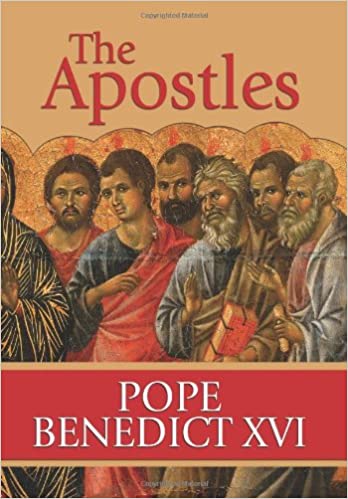 | The Apostles Our Sunday Visitor; First edition (July 2007). “This book is… my personal search ‘for the face of the Lord.’” —Benedict XVI Through the Apostles, we come to Jesus himself---Pope Benedict XVI In this fascinating and inspirational journey with the friends of Jesus, Pope Benedict XVI demonstrates a profound, unbreakable continuity--built upon the foundation of the Apostles and alive in the succession of the Apostles---by which Christ is present today in His people and His church. Let Pope Benedict be your guide as the distance of centuries is overcome and he reveals the impact of Christ s vision through the calling and works of the Apostles. Ignite your faith with this timeless connection between Jesus, His Apostles, the Church, and you. As Jesus said to his first two future Apostles, Come and see. Come so that you will be able to see. |
 | Europe: Today and Tomorrow Ignatius Press (March 2007). Written in late 2004 shortly before his election as Pope Benedict XVI, Ratzinger raises serious questions about the issues facing Europe amidst the new European Union and forming of a European Constitution. Some of the main issues he raises include: How did Europe originate and what are its boundaries? Who has the right to call himself European and be admitted into the new Europe? What about the spiritual roots of Europe and the moral foundation she is founded on? Ratzinger sees the lack of focus on these fundamental questions in the forming of a new Europe as a very serious dilemma for the future of Europe, and the world. The ties that Europe has to the USA, and the rest of the world make these questions and reflections by the current Pontiff of critical importance for facing the future together. |
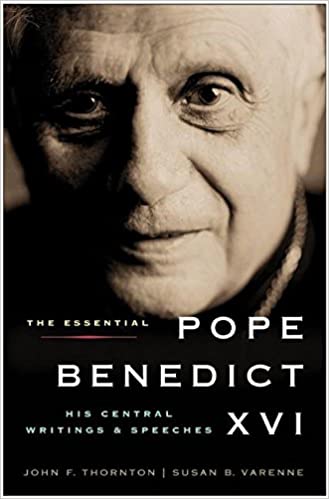 | The Essential Pope Benedict XVI: His Central Writings and Speeches edited by John F. Thornton & Susan B. Varenne. Introduction by D. Vincent Twomey. HarperOne (February 2007). On April 24, 2005, Cardinal Joseph Alois Ratzinger became Pope Benedict XVI, the twenty-first-century successor of the Apostle Peter and the spiritual leader of more than one billion Roman Catholics. Who is this complex man whose office grants him sole charge of the world's largest religion? How will his tenure influence the future? The Essential Pope Benedict XVI answers these questions through carefully chosen selections from his homilies, interviews, theological essays, and articles on the crises facing the church today. This collection lays out Benedict's thinking and relates it to a variety of contemporary issues, including modern culture's abandonment of traditional religious values, social mores regarding conception and the sanctity of life, current challenges to the priesthood, and the Catholic Church's tenuous relations with other world religions. |
 | On Conscience (Bioethics & Culture) Ignatius Press (January 2007). Prepared and co-published by the National Catholic Bioethics Center in Philadelphia, this book is a combination of two lengthy essays written by Cardinal Ratzinger and delivered in talks when he was head of the Congregation for the Doctrine of the Faith ["Conscience and Truth" (1984) and "Bishops, Theologians and Morality" (1991)]. Both talks deal with the importance of conscience and its exercise in particular circumstances. Ratzinger's reflections show that contemporary debates over the nature of conscience have deep historical and philosophical roots. He says that a person is bound to act in accord with his conscience, but he makes it clear that there must be reliable, proven sources for the judgment of conscience in moral issues, other than the subjective reflections of each individual. |
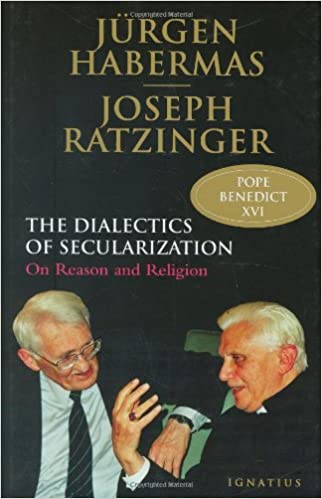 | The Dialectics of Secularization: On Reason and Religion Ignatius Press (January 2007). Two of the worlds great contemporary thinkers--theologian and churchman Joseph Ratzinger, now Pope Benedict XVI, and Jurgen Habermas, philosopher and Neo-Marxist social critic--discuss and debate aspects of secularization, and the role of reason and religion in a free society. These insightful essays are the result of a remarkable dialogue between the two men, sponsored by the Catholic Academy of Bavaria, a little over a year before Joseph Ratzinger was elected pope. Jurgen Habermas has surprised many observers with his call for "the secular society to acquire a new understanding of religious convictions", as Florian Schuller, director of the Catholic Academy of Bavaria, describes it his foreword. Habermas discusses whether secular reason provides sufficient grounds for a democratic constitutional state. Joseph Ratzinger/Benedict XVI argues for the necessity of certain moral principles for maintaining a free state, and for the importance of genuine reason and authentic religion, rather than what he calls "pathologies of reason and religion", in order to uphold the states moral foundations. Both men insist that proponents of secular reason and religious conviction should learn from each other, even as they differ over the particular ways that mutual learning should occur. |
 | Images of Hope: Meditations on Major Feasts Ignatius Press (October 2006). In Images of Hope: Meditations on Major Feasts, Joseph Cardinal Ratzinger (now Pope Benedict XVI) masterfully weaves together Scripture, history, literature and theology as he reflects on major feasts of the liturgical calendar. In each chapter, he examines works of sacred art that illustrate the hope we celebrate in our most important Christian holy days. What do the humble ox and ass at the manger of the Christ Child tell us about Christmas? In an icon of Christ's Ascension, what do the Savior's hands held in blessing promise us? What is the meaning of the sword held by the great statue of Saint Paul before the Roman church that bears his name? These and many other questions are explored with depth and sensitivity in this collection of meditations by the man who became Pope Benedict XVI. Several beautiful colored images of the relevant paintings, mosaics and sculptures accompany the rich and detailed text. |
 | God is Love [Deus Caritas Est] Ignatius Press (June 2006). Joseph Ratzinger, now Pope Benedict XVI, writes eloquently and persuasively about how one can live as a serious Christian in today’s secular world. He talks in depth about the true meaning of faith, hope, and love--the love of God and the love of neighbor. He also discusses at length the crucial importance of a lived faith, for the believer himself as well as being a witness for our age, and striving to bring faith in line with the present age that has veered off into rampant secularism and materialism. He passionately encourages the reader to practice a deep, abiding Christian faith that seeks to be at the service of humanity. As Joseph Ratzinger mentions in the preface, "the book presents in written form three sermons that the author preached in the Cathedral at Muenster to a congregation from the Catholic Student Chaplaincy, December 13-15, 1964." In other words, these are essays derived from sermons preached to college students toward the end of Vatican II. They are remarkable, among other reasons, for their insights into the ongoing Christian struggle to understand and realize in action "what it means to be a Christian". |
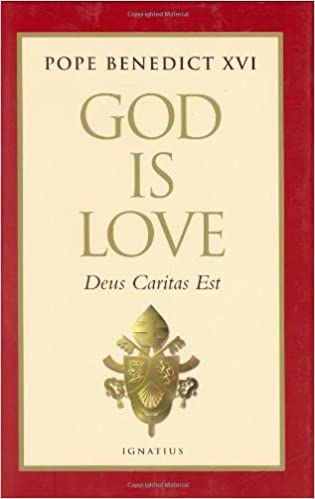 | Deus Caritas Est [God is Love] Ignatius Press (May 2006). Everyone needs love. Everyone desires love. But not everyone understands love. In fact, love is probably the most misunderstood subject in history. In his first Encyclical, Pope Benedict helps to clarify the meaning of love. He examines the nature of various kinds of love—human love and divine love, eros, friendship, and charity. He writes beautifully and inspirationally of how man was made for love by the God who is love, the God who became one of us out of love—Jesus Christ. In the second part of the Encyclical, Benedict addresses the Church's practice of love. He examines the relationship between justice and charity, as well as the call of every Catholic to serve others in love. The Pope's "love letter" to mankind is remarkably accessible and timely. |
 | God's Revolution: World Youth Day and other Cologne Talks Ignatius Press (February 2006). The theme of the World Youth Day in Cologne, Germany August 2005 was "We Have Come to Worship Him." Throughout these talks and encounters with the youth, Benedict reinforced the meaning of this theme by leading us to adore the Child who is God, whose love renews and transforms the whole world. Radiating from this book, as from World Youth Day, is a sheer joy over the beauty of faith, the beauty of Christ and of our life in Christ. Reading this book reinforces the conviction that, in the person of Pope Benedict XVI, God has given the Church a great Teacher of the faith, and also a great Pastor who knows the way that can lead us to intimacy with God. His special charism seems to be his ability to combine universal openness with Catholic identity, clear and comprehensive witness to the truth of Christ with the gentleness of fraternal charity. |
 | Without Roots: Europe, Relativism, Christianity, Islam Perseus Books Group (February 2006). Pope Benedict XVI joins the President of the Italian Senate to offer a provocative critique of the spiritual, cultural, and political crisis afflicting the West. On May 12, 2004, Pope Benedict XVI--then Cardinal Joseph Ratzinger--addressed the Italian Senate on the state of the West; the very same day, Marcello Pera, President of the Italian Senate, spoke before the Lateran College of the Papal University. Together they called upon the West to confront the spiritual, cultural, and political malaise that have afflicted it in the earliest years of the 21st century. In the months that ensued, before Cardinal Ratzinger's election to the papacy, they developed their ideas into the eloquent dialogue that is Without Roots -- a book that quickly became an Italian bestseller and is even more timely today than ever. With Europe shaken by the war in Iraq, terrorism, security, Israel, relations with the U.S., immigration, and the rejection of the EU constitution in both France and the Netherlands, the issue of European identity has profound implications for the rest of the world. Bringing together their unique vantage points as leaders of Church and State, Pope Benedict XVI and Pera challenge us to imagine what can be the future of a civilization that has abandoned its history for a relativist secularism. They call on the West to embrace a spiritual rather than political renewal-and to accept the moral beliefs that alone can help us to make sense of changes in technology, economics, and society. |
 | The Journey to Easter: Spiritual Reflections for the Lenten Season The Crossroad Publishing Company, Inc. (February 2006). Pope Benedict XVI offers us a great Lenten blessing in Journey to Easter. This book is rich meditation on the meaning of Lent, the significance of the birth and death of Jesus Christ, and the meaning of Jesus in the life of Christians everywhere. |
 | Christianity and the Crisis of Cultures Ignatius Press (February 2006) Written by Joseph Ratzinger shortly before he became Pope Benedict XVI, Christianity and the Crisis of Cultures looks at the growing conflict of cultures evident in the Western world. The West faces a deadly contradiction of its own making, he contends. Terrorism is on the rise. Technological advances of the West, employed by people who have cut themselves off from the moral wisdom of the past, threaten to abolish man (as C.S. Lewis put it)—whether through genetic manipulation or physical annihilation. In short, the West is at war—with itself. Its scientific outlook has brought material progress. The Enlightenment’s appeal to reason has achieved a measure of freedom. But contrary to what many people suppose, both of these accomplishments depend on Judeo-Christian foundations, including the moral worldview that created Western culture. More than anything else, argues Joseph Ratzinger/Benedict XVI, the important contributions of the West are threatened today by an exaggerated scientific outlook and by moral relativism—what Benedict XVI calls "the dictatorship of relativism"—in the name of freedom. Christianity and the Crisis of Cultures is no mere tirade against the moral decline of the West. Joseph Ratzinger/Pope Benedict XVI challenges the West to return to its roots by finding a place for God in modern culture. He argues that both Christian culture and the Enlightenment formed the West, and that both hold the keys to human life and freedom as well as to domination and destruction. Joseph Ratzinger/Benedict XVI challenges non-believer and believer alike. "Both parties," he writes, "must reflect on their own selves and be ready to accept correction." He challenges secularized, unbelieving people to open themselves to God as the ground of true rationality and freedom. He calls on believers to "make God credible in this world by means of the enlightened faith they live." |
 | The Way of the Cross Pauline Books & Media (November 1, 2005) Pray through the mystery of salvation with our new pope, Benedict XVI! Experience for yourself the Way of the Cross that Cardinal Joseph Ratzinger wrote for this time-honored devotion held on Good Friday at Rome's Colosseum. |
 | Mary: The Church at the Source Ignatius Press (October 2005) Two great theologians offer a spiritually rich approach to Mariology that brings into new relief the Marian contours of ecclesial faith. Ratzinger and Balthasar show that Mary embodies the Church and co-operates in giving birth to the Church in the souls of believers. At once profound and accessible, Mary offers a theologically balanced and biblically grounded presentation of traditional and contemporary thought on Marian doctrine and spirituality. "This book contains a treasury of reflections on the meaning of Mary for the Church, theology, and indeed for anthropology generally. An indispensable source for anyone who would understand the Marian doctrine intended by the Council and in the pontificate of John Paul II—and now Benedict XVI." —David Schindler, Ph.D. Dean, John Paul II Institute "This marvelous book of theological meditations on Mary by the two most important Catholic theologians of the 20th century explains why Mary is such a peerless jewel set inside that wretched frame called human history. Because Mary is the very birthplace of the Church and thus the locus of all that gives us hope, our tainted and fallen race itself has hope." —Fr. Edward Oakes, S.J. |
 | On The Way to Jesus Christ Ignatius Press (October 2005) On the Way to Jesus Christ is a series of meditations that Pope Benedict XVI wrote while he was Prefect for the Congregation of the Doctrine of the Faith. The true Jesus, he writes, is the Jesus of the Gospels, who "is quite different, demanding, bold. The Jesus who makes everything OK for everyone is a phantom, a dream, not a real figure. The Jesus of the Gospels is certainly not convenient for us. But it is precisely in this way that he answers the deepest question of our existence, which--whether we want to or not--keeps us on the lookout for God, for a gratification that is limitless, for the infinite. We must again set out on the way to this real Jesus." This book also examines whether Jesus Christ is the only savior, and the Church's responsibility to evangelize. It concludes with reflections on Jesus' Presence in the Holy Eucharist, and the Catechism of the Catholic Church's presentation of the Christian mystery as seen through the Catechism's dynamic view of Sacred Scripture. On the Way to Jesus Christ is for anyone -- believer or unbeliever -- who wants better to understand the true Jesus, the Jesus of the Gospels, the Christ of Christianity" Cardinal Joseph Ratzinger, now Pope Benedict XVI, has written a brief but compelling invitation to know Jesus Christ as He really is: bold, demanding, merciful, strong, and the answer to our deepest longings. This is a must-read book for anyone serious about deepening his or her faith." -- Charles J. Chaput, O.F.M. Cap., Archbishop of Denver |
 | Pilgrim Fellowship Of Faith: The Church As Communion Ignatius Press (April 2005) On the occasion of the Cardinal's seventy-fifth birthay, his former students have selected essays, lectures, letters, and conferences that Ratzinger has written in recent years-writing that they feel best represents the position of the Cardinal on issues of theology, the modern world, secularism, non-Christian religions, and other key topics of the Catholic Church. This book, characterized by Ratzinger's concisely reasoned style, is an invaluable resource to those who wish to understand the modern Church, as well as a treasured volume for those who are students of Ratzinger's theology. "Cardinal Ratzinger is one of the great spirits and most distinguished theologians of contemporary Catholicism. This tribute is a living testimony to Cardinal Ratzinger's lifelong labors on behalf of the communion of the Church, which is rooted in the love of Christ. No one demonstrates better than Cardinal Ratzinger that the Church's tradition is a living and dynamic reality, born of a truth that everyone can know and love -- and, in so doing, be transformed." -- George Weigel |
 | The End of Time?: The Provocation of Talking about God Ignatius Press (January 2005) On the occasion of his seventieth birthday Professor Johann Baptist Metz was joined by Cardinal Joseph Ratzinger, Prefect of the Vatican's Congregation for the Defense of the Faith, as well as by Eveline Goodman-Thau, a Jewish philosopher of religion, and Protestant theologian Jürgen Moltmann, for a meeting at Ahaus Palace on the subject of God and the end of time. This work, translated for the first time from German, now makes available the proceedings from this significant meeting. Of particular interest for readers is the joint appearance here of Metz and Ratzinger, two theologians who had clashed in the past and who are, theologically, poles apart. It is remarkable here that the participants were able to put aside personal differences and church politics to "do theology." Readers will read with appreciation this thought-provoking work that offers them the unique opportunity to listen in on what was an important forum for theological discussion and an experiment in church politics. |
 | Introduction to Christianity Ignatius Press (November 30, 2004) [Reprint, with new introduction by Cardinal Ratzinger]. Revised Edition. One of Cardinal Ratzinger's most important and widely read books, this volume is a newly revised second edition with an improved translation and an in-depth 20 page preface by the Cardinal. As he states in the preface, since this book was first published over 30 years ago, many changes and significant events have occurred in the world, and in the Church. But even so, he says he is firmly convinced that his fundamental approach in this book is still very timely and crucial for the spiritual needs of modern man. That approach puts the question of God and the question about Christ in the very center, which leads to a "narrative Christology" and demonstrates that the place for faith is in the Church. ' Thus, this remarkable elucidation of the Apostle's Creed gives an excellent, modern interpretation of the foundations of Christianity. Ratzinger's profound treatment of Christianity's basic truths combines a spiritual outlook with a deep knowledge of Scripture and the history of theology. |
 | Truth And Tolerance: Christian Belief And World Religions Ignatius Press (October 2004) Is truth knowable? If we know the truth, must we hide it in the name of tolerance? Cardinal Ratzinger engages the problem of truth, tolerance, religion and culture in the modern world. Describing the vast array of world religions, Ratzinger embraces the difficult challenge of meeting diverse understandings of spiritual truth while defending the Catholic teaching of salvation through Jesus Christ. "But what if it is true?" is the question that he poses to cultures that decry the Christian position on man's redemption. Upholding the notion of religious truth while asserting the right of religious freedom, Cardinal Ratzinger outlines the timeless teaching of the Magisterium in language that resonates with our embattled culture. A work of extreme sensitivity, understanding, and spiritual maturity, this book is an invaluable asset to those who struggle hear the voice of truth in the modern religious world. "Beyond all particular questions, the real problem lies in the question about truth. Can truth be recognized? Or, is the question about truth simply inappropriate in the realm of religion and belief? But what meaning does belief then have, what positive meaning does religion have, if it cannot be connected with truth?" Joseph Cardinal Ratzinger (From the Preface) |
 | God Is Near Us: The Eucharist, the Heart of Life Ignatius Press (June 2003) The Second Vatican Council says, "We ought to try to discover a new reverence for the Eucharistic mystery. Something is happening that is greater than anything we can do. The liturgy is the summit toward which the activity of the Church is directed; it is the font from which all her power flows." This profound statement about the Eucharist stands at the center of this book by Cardinal Ratzinger. He compellingly shows us the biblical, historical, and theological dimensions of the Eucharist. The Cardinal draws far-reaching conclusions, focusing on the importance of one's personal devotion to and adoration of the Blessed Sacrament, for the personal reception of Communion by the individual Christian, as well as for the life of the Church. For Ratzinger, any transformation of the world on the social plane grows out of the celebration of the Eucharist. He beautifully illustrates how the omnipotent God comes intimately close to us in the Holy Eucharist, the Heart of Life. "Not only does the Cardinal shed his customary theological light on many subjects, but as he does in other books, he applies his insights very directly to Catholic life and devotion. Coming at this time, this book is part of the effort of many to see the Eucharist restored to the center of Catholic piety and devotion." -- Fr. Benedict Groeschel, C.F.R., Author, The Rosary: Chain of Hope |
 | God and the World: A Conversation With Peter Seewald Ignatius Press (August 2002) During his years as Prefect of the Congregation for the Doctrine of the Faith, well-known Vatican prelate Joseph Cardinal Ratzinger has given three in-depth interviews. The first two interviews have become best selling books: The Ratzinger Report and Salt of the Earth. Because of the tremendous reception those books received, the Cardinal agreed to do another interview with journalist Peter Seewald, who had done the very popular Salt of the Earth interview. This third in-depth interview addresses deep questions of faith and the living of that faith in the modern world. The interview took place over three full days spent at the Benedictine Abbey of Monte Cassino in a setting of the silence, prayer, and hospitality of the monks. For this meeting with the highly regarded Churchman, theologian, and author, the seasoned journalist, who had fallen away from the faith but eventually returned to the Church, once again provided a very stimulating, well-prepared series of wide-ranging questions on profound issues. The Cardinal responds with candor, frankness and deep insight, giving answers that are sometimes surprising and always thought provoking. "When Cardinal Ratzinger, one of the Church's great wise men, sat opposite me in the Abbey and patiently recounted to me the Gospel and the belief of Christendom from the beginning of the world to its end, something of the mystery that holds the world together became more tangible. 'Creation itself', he said, 'bears within itself an ordered pattern from which we can understand the ideas of God -- and even the right way to live.'" --- Peter Seewald |
 | The Spirit of the Liturgy Ignatius Press (September 2000) Cardinal Ratzinger compares this work to a much earlier classic of the same title by Romano Guardini because Ratzinger feels that his insights here are similar with what Guardini achieved in his time regarding a renewed understanding of the Liturgy. "My purpose here is to assist this renewal of understanding of the Liturgy. Its basic intentions coincide with what Guardini wanted to achieve. The only difference is that I have had to translate what Guardini did at the end of the First World War, in a totally different historical situation, into the context of our present-day questions, hopes and dangers. Like Guardini, I am not attempting to involve myself with scholarly discussion and research. I am simply offering an aid to the understanding of the faith and to the right way to give the faith its central form of expression in the Liturgy." |
 | Many Religions, One Covenant: Israel, The Church and The World Ignatius Press (September 1999) In Many Religions, One Covenant, Cardinal Joseph Ratzinger spans the deep divides in modern Catholic scholarship to present a compelling biblical theology, modern in its concerns yet classical in its breadth. It is his classical mastery, his ressourcement, that enables the Cardinal to build a bridge. Cardinal Ratzinger seeks to deepen our understanding of the Bible's most fundamental principle. The covenant defines religion for Christians and Jews. We cannot discern God's design or his will if we do not meditate upon his covenant. The covenant, then, is the principle that unites the New Testament with the Old, the Scriptures with Tradition, and each of the various branches of theology with all the others. The covenant does more than bridge the gaps between these elements; it fills in the gaps, so that biblical scholarship, dogmatic theology, and magesterial authority all stand on common ground and solid ground. "A book we have long awaited. By renewing the Church's appreciation of the new covenant, Cardinal Ratzinger proposes a fully integrated Christian life, with Christ at the center of the Scriptures, but also at the center of the Church today. For in the Eucharist he is still, as ever, fulfilling the old covenant and ratifying the new." -- Scott Hahn, Author, Rome Sweet Home |
 | Milestones: Memoirs 1927-1977 Ignatius Press (November 1998) "Here is Cardinal Ratzinger at his most surprising. Who imagines him a teenager risking his life escaping a Nazi forced-labor camp? Or a doctoral candidate shattered by rejection of his dissertation? Or a priest telling of 'the sufferings necessary for the priestly ministry . . . those dark nights that alone can give full shape to the radical assent a priest must give'? Milestones , rich with theological insights as are all his works, gives us finally Ratzinger the person. He is a joy to meet." - Cardinal John O'Connor, Archbishop of New York. |
 | Salt of the Earth: The Church at the End of the Millennium: An Interview With Peter Seewald Ignatius Press (October 1997) A full-length interview with a secular journalist on a host of controversial and difficult issues facing Catholicism and Christianity at the end of the millennium. Similar to his best-selling book interview in 1985, The Ratzinger Report, Ratzinger responds with candor and insight, giving answers that are often surprising and always thought-provoking on a series of wide-ranging topics regarding the present and future state of Christianity. Ratzinger begins by discussing his own life, including his family life, being a theology professor and writer, becoming a Bishop, Cardinal and the Pope's top authority on doctrine. He then discusses the problems of the Catholic Church today and talks about the challenges and hopes of the future of Church and the world at the beginning of the Third Millennium. "This is Cardinal Ratzinger at his free-wheeling best, virtually roving the world with theological and cultural analyses as pungent as they are dazzling. His candor is breathtaking." -Cardinal John O'Connor "One of the most arresting, enjoyable books I've read in years. The Joseph Ratzinger who emerges from these pages is amazingly frank and engaging-a man with a superb intellect but also with a simple, humble, generosity of spirit. He offers us tremendous encouragement." -Archbishop Charles Chaput "An absolutely fascinating book, like a personal visit with the Cardinal. It not only reveals much of the mind and personality of one of the key figures in modern Catholic history, but it clarifies better than anything I have read the origin of the present crisis in western civilization and in the Church." -Fr. Benedict Groeschel |
 | Gospel, Catechism and Catechesis: Sidelights on the Catechism of the Catholic Church Ignatius Press (September 1997) Ratzinger, one of the key persons responsible for the compilation of the Catechism of the Catholic Church, offers new insights on the catechetical character and Biblical foundation of the worldwide bestselling Catechism that has had such a positive response from ordinary Catholics across the globe. But he acknowledges that the response of many theologians and "professional religionists" has been negative toward the Catechism. He says that if theologians don't want to be "shut out" of this worldwide development of sensus fidei and lose touch with the common Catholic, they will have to engage the Catechism positively. The main purpose of this book is to offer an invitation to this changed approach to the Catechism. He wants people to see, as he shows here, how the Catechism is an excellent teaching tool that responds to man's deepest questions about the meaning of life, how to live a good life, and how to attain happiness in this life and in eternal life. He shows how the Catechism affirms that man's happiness is love, and that the essence of true love has been manifested in the Person of Jesus Christ. |
 | Called to Communion: Understanding the Church Today Ignatius Press (March 1996) Cardinal Ratzinger examines the need of the Papal Primacy to ensure Christian unity; the true meaning of the Priesthood as a sacrament and not a mere ministry; the necessity of the Eucharist as the Sacrifice of the Savior now offering Himself on our altars; the role of the Bishops as successors of the Apostles; the value of suffering in union with Christ crucified and the indispensable service of the laity in the apostolate. |
 | In the Beginning...: A Catholic Understanding of the Story of Creation and the Fall Wm. B. Eerdmans Publishing Company (September 1995) Ratzinger discusses God as creator, the meaning of the biblical creation accounts, the creation of human beings, sin and salvation, and the consequences of faith in creation. |
 | The Nature and Mission of Theology: Essays to Orient Theology in Today's Debates Ignatius Press (April 1995) Cardinal Ratzinger wrote this book in response to the dialogue going on today concerning theology and the clarification of its methods, its mission and its limits which he thinks has become urgent. Ratzinger states: "To do theology-as the Magisterium understands theology-it is not sufficient merely to calculate how much religion can reasonably be expected of man and to utilize bits and pieces of the Christian tradition accordingly. Theology is born when the arbitrary judgment of reason encounters a limit, in that we discover something which we have not excogitated ourselves but which has been revealed to us. For this reason, not every religious theory has the right to label itself as Christian or Catholic theology simply because it wishes to do so; whoever would lay claim to this title is obligated to accept as meaningful the prior given which goes along with it." |
 | Introduction to the Catechism of the Catholic Church Ignatius Press (April 1994) This is a valuable introduction to the Catechism by the general editor of the Catechism (Schonborn) and the head of the Bishops Commission for the implementation of the Catechism (Ratzinger). Providing helpful insights on how to read and study the Catechism, this book includes a prehistory of the Catechism, an overview of its structure and contents, the major themes and methods in it, a special introduction to the four parts of the Catechism, and specific advice on how to use the Catechism. Ratzinger and Schonborn illuminate the Catechism's teaching on faith, morals, prayer and sacraments, and how a Catholic lives those teachings in today's world. |
 | A Turning Point for Europe?: The Church in the Modern World-Assessment and Forecast Ignatius Press (March 1994) Cardinal Ratzinger addresses the challenges and responsibilities that both the Church and society in Europe face after the collapse of Marxism. Both liberalism and Marxism have denied religion the right to have any influence on public affairs and the common future of humanity. Since there is also a great spiritual emptiness growing in the West with the increased secularization, consumerism and hedonism, Ratzinger's comments apply as much, if not more, to the United States as well. With the downfall of Marxism, religion has been discovered anew as an ineradicable force for both the individual and society. While there is renewed interest in religion, the dangers also exist to lay hold of religion as an instrument to serve various political ideas. Ratzinger, whose theological work has often dealt with the "reasons for our faith," reflects upon the various problems facing humanity at this turning point of our history and offers genuine hope based upon a deep Christian faith. He also addresses the critical role that the Church has in relationship to the world and the essential task of bringing Christ back into our culture. |
 | The Meaning of Christian Brotherhood Ignatius Press; 2 edition (April 1993) Written over three decades ago, Cardinal Ratzinger's profound treatise on the true meaning of Christian brotherhood is perhaps even more timely and important now as a clear statement on the biblical grounds for cooperation among believing Christians. In treating Christian brotherhood from the perspective of salvation history, Ratzinger opens up the meaning of both the Old and New Testament in this most essential area. After establishing the distinctively Christian sense of brotherhood (vis-'-vis Judaism, Hellenism, Stoicism, the Enlightenment, and Marxism), he shows how fraternal charity can only be perfected through God's fatherhood, Christ's divine sonship, and our brotherhood in Christ. |
 | Co-Workers of the Truth: Meditations for Every Day of the Year Ignatius Press (December 1992) Cardinal Ratzinger offers selected passages from his profound spiritual and theological writings as meditations for each day of the year. He picked the title of this book from verse 8 in the third letter of St. John, which he also adapted for his coat of arms: ``Co-Workers of the Truth." Just as these words signify for St. John the participation of all the faithful in the service of the Gospel, which includes the faithful extending hospitality to all who come as messengers of faith, so too Ratzinger shows the importance of our uniting charity with truth to make possible the proclamation of the Gospel. Through his meditations here, he hopes to help awaken in each reader the courage and generosity to become co-workers with the Gospel, which is the truth of Jesus Christ. The Cardinal picked the title of this book from the passage in the third letter of Saint John, verse 8, which he also adapted for his coat of arms: "Co-Workers of the Truth." Just as these words signify for Saint John the participation of all the faithful in the service of the Gospel, which includes the faithful extending hospitality to all who come as messengers of faith, so too Ratzinger shows the importance of our uniting charity with truth to make possible the proclamation of the Gospel. Through his meditations here, he hopes to help awaken in each reader the courage and generosity to become co-workers with the Gospel, which is the truth of Jesus Christ. |
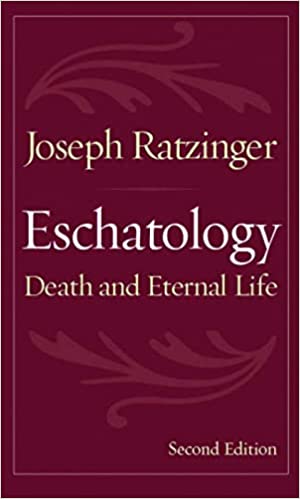 | Eschatology, Death and Eternal Life Catholic University of America Press; 2 edition (October 7, 2007) Originally published in English in 1988, Joseph Ratzinger's Eschatology remains internationally recognized as a leading text on the "last things"--heaven and hell, purgatory and judgment, death and the immortality of the soul. This highly anticipated second edition includes a new preface by Joseph Ratzinger/Pope Benedict XVI and a supplement to the bibliography by theologian Peter A. Casarella. Eschatology presents a balanced perspective of the doctrine at the center of Christian belief--the Church's faith in eternal life. Recognizing the task of contemporary eschatology as "to marry perspectives, so that person and community, present and future, are seen in their unity," Joseph Ratzinger brings together recent emphasis on the theology of hope for the future with the more traditional elements of the doctrine. His book has proven to be as timeless as it is timely. |
 | Principles of Catholic Theology: Building Stones for a Fundamental Theology Ignatius Press (April 1987) A collection of articles and talks written around a central theme the fundamental structure of Christianity: Catholicism, the inter-relationship of other forms of Christianity, the features that distinguish Catholicism from other Christian theologies. Ratzinger outlines the fundamental principles of theology and the proper relationship of theology to Church teaching and authority. |
 | Behold The Pierced One Ignatius Press Ignatius Press (February 1987) In this profound and illuminating work, Joseph Cardinal Ratzinger turns the gaze of an accomplished theologian upon the crucified Savior. This synthetic and meditative work is theological without being abstract or dry, and spiritual without being sentimental. The pierced heart of Christ must be the heart of theology and Christian life as well. Proceeding from the prayerful dialogue between the Incarnate Son and his Eternal Father, Joseph Ratzinger shows how one can approach the mystery of the Heart of Christ only through the imitation of this prayer. To know and understand Jesus we must participate in his prayer. The prayer of Christ must be the interior life of all who are joined to him in his Body, the Church. Using the Old and New Testaments and the Church Fathers, Ratzinger shows that the ecclesial community (the Church) was born from the pierced Heart of Christ on the Cross. |
 | Principles of Christian Morality by Heinz Schurmann (Author), Joseph Cardinal Ratzinger (Author), Hans Urs von Balthasar (Author) Ignatius Press; First American edition (June 1, 1986) 104 pages A collection of essays by three giants of twentieth-cenutry theology: Joseph Ratzinger (now Pope Benedict XVI), Hans Urs von Balthasar, and Heinz Schurmann. Balthasar's and Schurmann's essays were written for the International Theological Commission. Schurmann examines how the New Testament's teaching provides enduring moral norms for Christian conduct. Balthasar presents nine basic principles of the Christian moral life. Ratzinger, who originally wrote this essay as a series of articles for L'Osservatore Romano, addresses the relationship between faith and morality, and the place of the Church's teaching authority with regard to moral issues. |
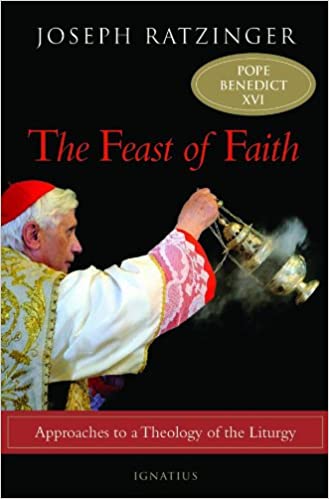 | Feast of Faith: Approaches to a Theology of the Liturgy Ignatius Press (May 1986) Are liturgy and prayer important in an age of political crisis and the technological manipulation of human life? Yes, declares Joseph Ratzinger, now Pope Benedict XVI. Genuine worship of God involves the sacred liturgy and prayer. Only if man authentically worships God will true human dignity be protected, and the principles and the power to resolve the crises of our age be found. The Feast of Faith sets our to answer one basic question: How can we pray and praise God as we should? Written before Cardinal Ratzinger became Pope, this timeless book reflects enduring and inspirational insights regarding divine worship and the sacred liturgy. |
 | The Ratzinger Report: An Exclusive Interview on the State of the Church Ignatius Press; New Ed edition (June 1985) Cardinal Ratzinger speaks candidly and forcefully about the state of the Church in the Post-Vatican II era. Here is the comlete text of a meeting many have called a "historical turnabout" in the Church. The roots of the crisis that has troubled Catholics in the twenty years since the Council are analyzed with forthright clarity by one of the most authritative voices in the Vatican. Here is a clear and uncompromising report on the dangers that threaten the Faith, fom one who every day receives the most reliable information from every continent. Yet Ratzinger's observations are as hopeful and balanced as they are clear-sighted, forcefully re-affirming the immense and positive work of Vatican II, whose genuine fruits this book provides a guideline for achieving. |
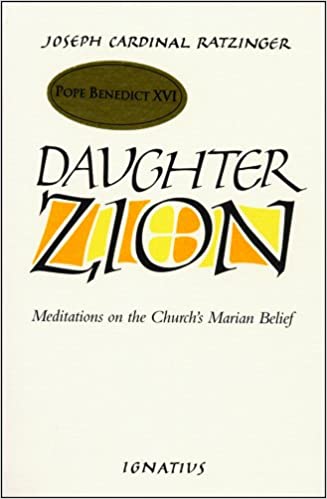 | Daughter Zion: Meditations on the Church's Marian Belief (Ignatius Press, June 1983) Daughter Zion explores the biblical witness to the Church's Marian dogmas- Mary's role as Mother of God, her virginity, the Immaculate Conception, and her Assumption into heaven. Cardinal Ratzinger examines how these beliefs are linked to the Church’s faith in Jesus Christ. Far from competing with the truth about Christ, the Church’s Marian beliefs uphold and underscore that truth. Mary’s role in salvation, according to Cardinal Ratzinger, was anticipated in the Old Testament. She was prefigured in Eve, the Mother of the Living; in the holy women of the Old Testament, such as Sarah, Hannah, Deborah, Esther, and Judith; and in the prophetic image of the daughter Zion. Cardinal Ratzinger also considers Mary’s place as the embodiment of created wisdom, who faithfully received the Uncreated Wisdom of the World of God in the Incarnation. Daughter Zion avoids the extremes of denying any biblical foundation for Marian doctrine on the one hand and fundamentalistic proof-texting on the other. Instead, the author beautifully and lucidly develops key biblical themes to help readers understand and appreciate the Mother of God. |
Books by Joseph Ratzinger [Pope Benedict XVI]
Subscribe to:
Comments (Atom)
